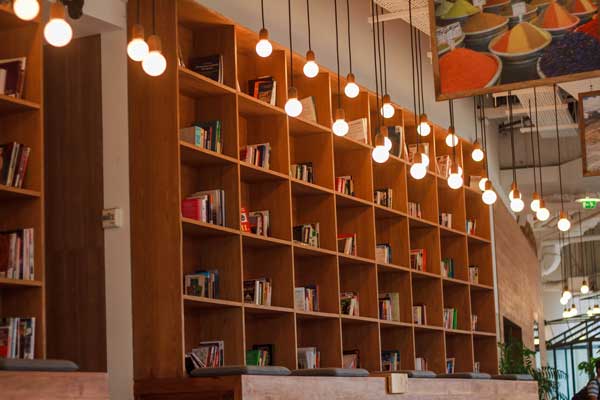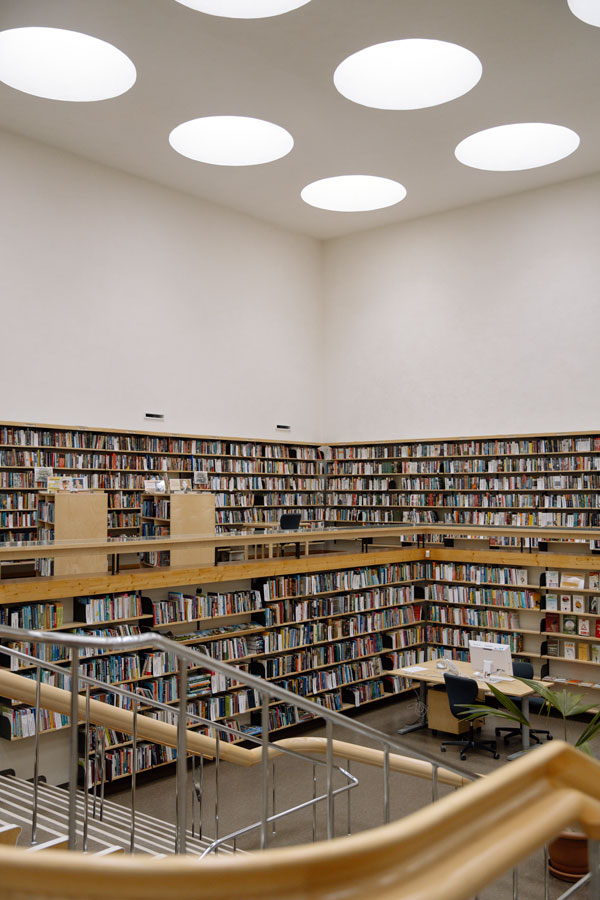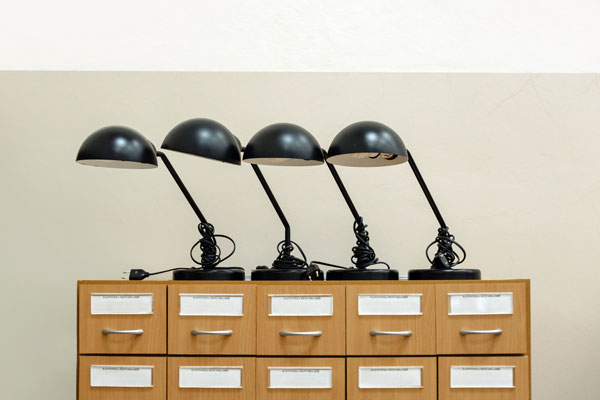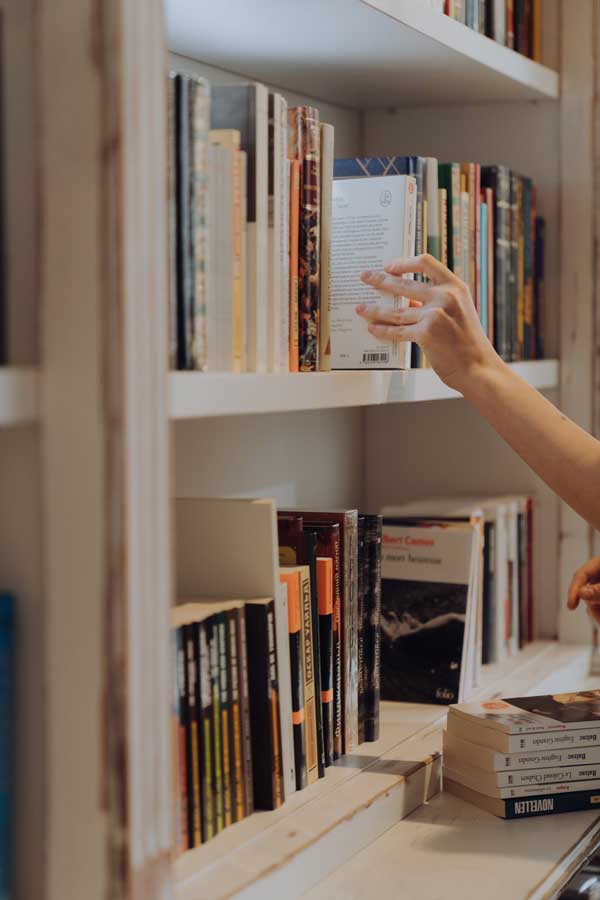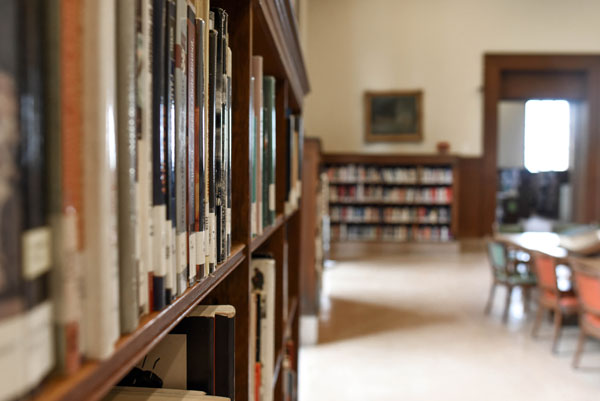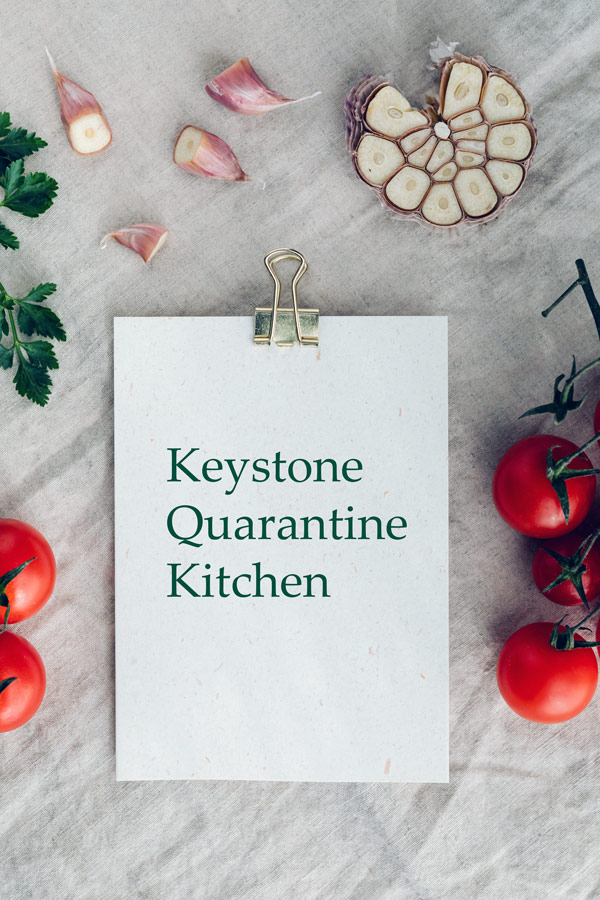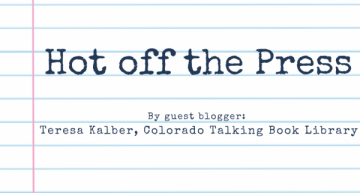- Katy Patrick
- News
As states ease restrictions and some staff are returning to large pile-ups of returned books (or a suspicious absence of returned books), and things are still far from “business as usual”, how is everyone handling it?
I’ll discuss some approaches that have come into our support inbox so far, but everyone has a little bit different situation, so remember these are just a few ideas to get you started. Please continue to contact us as needed to help strategize and determine the best workflows to get you back on track.
Albany called in reinforcements from other departments and raised their card limit while they get caught up. Their strategy was to start by checking out the waiting Mail Cards and then focus on check-ins knowing that they had the extra staff to handle the surge of assignments this would cause the next day.
Libraries that don’t have reinforcements to call on likely want to take a somewhat different approach.
Braille Institute, for example, is working to get caught up on check-ins but is not ready to start sending outgoing mail again. They set their Daily Circulation Cutoff to zero, but that control stops Nightly from assigning books... not Reserves, which are filled on check-in. So, once they’ve finished checking in books each day, they are then Unassigning the whole batch that has been generated this way from the Mail card Review screen. Because the titles have only been Assigned, not checked out, the reserves will stay on the patron records. However, this approach helps to keep assignments fresh—if the patron downloaded the title from BARD in the meantime, the reserve will be cleared when Braille Institute loads their BARD Stats. They are also taking this time to shelve everything that was currently on turnaround, clean the shelves, and start the check-ins with a new shelf order and set-up.
Oregon Talking Books is returning to sending outgoing books, but only by Duplication. Because switching a patron to Duplication service shifts KLAS to only counting duplication orders towards the NS Cutoff, it won’t matter that they are catching up on check-ins more gradually. As an added complication, they are required to send all outgoing containers inside a manilla envelope due to the life of the virus on plastic. We’re working with them to generate these additional mailing labels, which will allow them to greatly ramp up the number of cartridges they can send per day.
Nevada is also making the switch to Duplication. They've started with a nightly Duplication Order limit of 100, though they may need to increase it as they get more of their patrons converted and more experience with duplicating. We helped them unassign the large batch of outstanding Physical service mail cards, and like Braille Institute, they will be unassigning the new ones generated each day as Reserves are made available. However, because those patrons are likely to be great candidates for duplication, we’ve recommended they export the list from the “Mailing Cards – Review” screen before unassigning the batch. They can then save the list of Patron IDs to import as a query set and convert them to duplication using the “Batch Update Patron Profile” tool.
We hope this gave you some things to think about—both in terms of approaches to take and complications to consider. Please reach out any time you’d like some help, or if you just want to confirm something will work the way you expect it to.
- Craig Hayward
- News
Our KLAS Users' Group officers contacted some KLAS users to ask them to share how their library / organization is faring and what policy, service, or other changes they may have enacted in response to library closure or limited staffing related to Covid19. We welcome submissions from any KLAS user who wants to share their experience during this time. Please contact Chandra Thornton, President, KLAS Users' Group or Drea Callicutt, Keystone Systems if you're interested in contributing a post.
Our next guest post in this series is from Craig Hayward, Systems and Digital Services Librarian at NC LBPH.
North Carolina in a time of COVID 19
North Carolina started hearing about what was happening in Washington State, and their library staff, in late February-early March and thanks to the information that the library there provided, we started preparing for how to quarantine items and figuring out how staff could work either from home or in socially distanced situations in the library. The most difficult part of the situation in planning would be with our circulation staff of 5 who most of what they do is handling physical items and have to work in close physical proximity for some parts of their work? Still a plan was set in motion and we prepared to transition to whatever we would be presented. The second week of March, the library closed to the public officially. This also meant the volunteers were not allowed into the building, making some of the work we do, in inspections and audio narration more difficult.
On March 23, 2020, the Governor of North Carolina gave the Stay At Home Order, mandating that all employees were to work from home, or go on administrative leave, if they could not do any work at home. A week prior to that, my own county (Durham) had issued the order which meant that I would have to start working from home sooner. At the time, 5 of us had already begun teleworking, leaving most of our staff of 25 in-house working, while plans were made to bring our work home for real. There was a large backlog with the state in getting laptops so staff could work from home, so a number of staff brought in their own laptops, while waiting frantically for the state to get them something more “official”. All of this was so that KLAS could be installed and work could happen from home. This would mark a new chapter for many of what work looks like now.
Needless to say there was a big shock to the system, both for staff and patrons. No one is there to answer the phone, just reply to voicemail and email. Ironically, the library is getting a new phone voice over IP phone system, but the shutdown happened at the absolute worst time in this project, since the old system offers no way to forward calls on. The new system will allow you to easily forward your office number to your cell phone. The only time I’ve been back to the library since the shutdown began was this past Tuesday to test out a new piece of hardware to make sure it worked. In the meantime, special arrangements have been made to get the library’s main phone line to ring to another one at the State Library so voicemail could be collected and accessed by our staff.
Without anyone available to run duplication on demand orders on cartridge, that service sits awaiting our return. Our only answer is to get patrons setup on BARD and / or use the local downloading resources we have. To keep chaos at the post office as minimal as we could, we asked patrons to hold onto their materials until we were open again. But patrons can only respond as they do and material piled up in the mailing facility. As a result we then started an occasional truck run to pick up mail hampers. The first run, amazed our driver with the number of hampers sitting and waiting to return materials to the library.
Since our shutdown, only 3 staff members, myself included, have even entered the building at any point for any amount of time. No one is allowed back in until we open. Even once we open, the number of people allowed in the building will be done in phases. Phase 1 allows for a max of 8 people in the building at any given time. Staff will rotate days in and out. At the time of this writing, we are closed to the public and staff until further notice, potentially until the end of May.
Staff working from home pick up voicemail messages from a central voicemail box, setup temporarily by the State Library, and return calls. They also monitor and answer the library’s email box. For anyone answering we ask that they block their phone numbers for privacy. If the patron does not accept blocked calls, we do our best to work to relay information. One option we have looked at for greater transparency is a Google Voice number that would be branded with State of North Carolina to keep it private. But that’s temporary and may take some time. We look forward to the day we get our new voiceover IP phone system to help keep our teleworking experience more normal by allowing our office numbers to connect while out of the library, but our temporary solution has allowed us to continue serving our patrons during a difficult time.
Once a week either the Director of the library or the State Librarian makes a trek to the library and retrieves new patron applications, faxes, and bits of other mail. These items are worked on by our Public Service staff from home.
Our volunteers will return when the public does. Book and magazine production in our local recording studio has been put on hold. However, a couple of us on staff are using home recording as an option (voice recording apps on mobile devices, Audacity on laptops) to produce "Tar Heel Talk", the library’s newsletter. This is a particularly popular publication for our readers. We have also turned to revamping our audio offerings with making "Tar Heel Talk" into a podcast and creating a new podcast that showcases locally recorded books and magazines available for download. With "Notable On NOBLE" we give listeners a bit of the annotation and the first 2-3 minutes of the first chapter of a book or a magazine articles to encourage patrons to try out some more materials and at least offer them something to read. This joins the already popular "Heard Any Good Books Lately?" Podcast and a couple of new offerings are coming soon.
Our machine unit sits and waits to fulfill machine requests, until the library opens again. Machines are received by mail and brought into the library with other items from the post office. All machines have a 7-day quarantine period, so the time away has helped in this regard.
On this topic when we were opened the standard quarantine period for books was 3 days. This will continue once we return and for the foreseeable future. One benefit of the shutdown is that we have decided to ramp up duplication on demand efforts and when we return many individual digital talking books cartridges will be withdrawn from the collection and set aside for recall rather than checking them back in.
Some bright spots have come out of this situation, also. First off, we have the implementation of Live Chat on our library’s homepage. In these times when it’s hard to reach staff directly by telephone and email, this service acts like a kind of instant messaging service to allow staff to help patrons get books and directly answer questions about our service and happenings in real-time. Staff were hesitant that patrons wouldn’t use it, but it has been well received. It also has helped strengthen our collaborative efforts with the State Library by adding our library to this service. They can now more easily direct people that come to their side back to ours, and it allowed us to evaluate the product they use for accessibility. It also has led to some interesting real-time conversation with patrons and their appreciation of having a way to connect.
Most of our staff have been working on the larger NLS Unrated Books project while working at home. This time out of the library has meant having to fill in gaps and this situation is useful.
Another project that this pushed forward was a mass migration of groups of staff-direct, non-automation, service patrons. Having the time out of the library to do this has been a real help. The bulk conversions to duplication service have happened and then the reader advisors (when not answering questions) have been able to go in and tailor first run service queues for a batch of around 1800 patrons new to this type of service. This has made this project more manageable.
This has also been a chance to update parts of our website to better serve our patrons. Things like our local download site, NOBLE, and creating new service spaces with an expanded and better organized podcasts section.
On the topic of local collections, we’ve been able to have time to transfer our collection in totality from our local network attached storage device to books.klas.com for better access by our 3 Scribe units once we go back to open operations. At this writing we have just gotten approval (in record time) for adding a 4th Scribe unit, so that we will can keep up with the demand of daily orders (which average around 300 per day) and keep a walk-in service for patrons, once we are allowed to reopen our building to the public.
It has accelerated the use of communication tools like Microsoft Teams. Prior to this situation no one really saw a need for it, other than our administrative team since they were having meetings and they had been communicating daily. Now everyone in the library uses Teams at various levels. Some of us talk daily through it directly with various people the way we would normally go down to each other’s offices and have conversations. Having my Director call me through Teams the first time was quite a surprise in my house.
Zoom meetings have become a more regular happening, rather than a special occasion. They are just the way we have larger meetings of groups, from the entire staff of the State Library to Departmental meetings within our own building, and for planning events like an upcoming retirement party.
The other avenue that opened up for communication has been a regular Wednesday check-in for groups of staff by text message. This is something that will stay around while we continue to telework and probably beyond as we operate with greatly reduced staffing in the library building itself.
Overall, I can’t say that the situation happened at an ideal time. Conferences got postponed and face-to-face time with staff is missed greatly. But perhaps this situation could be a catalyst for changes to the program that were already starting and maybe for a change in attitude about virtual (non-physical) materials services, like downloading and talking to staff through a website for our patrons.
Every major event that happens and changes us culturally has an impact of how life goes on after ward. Once you get used to this way of working and living, it’s hard to go back to the way you did things prior.
- Erin Pawlus
- News
Our KLAS Users' Group officers contacted some KLAS users to ask them to share how their library / organization is faring and what policy, service, or other changes they may have enacted in response to library closure or limited staffing related to Covid19. We welcome submissions from any KLAS user who wants to share their experience during this time. Please contact Chandra Thornton, President, KLAS Users' Group or Drea Callicutt, Keystone Systems if you're interested in contributing a post.
Our next guest post in this series is a collaborative one from Erin Pawlus, Assistant Administrator, Arizona Talking Book Library, and Jared Leslie, Director of Media Services, Foundation for Blind Children.
Our teleworking adventures at the Arizona Talking Book library began on March 23, 2020. At that time, we had about half our staff working on site on an alternating schedule, with the rest working from home. Since then, we have managed to pare it down to about 5 people in the building at a time. Other than the regular trill of phone calls, it has been remarkably quiet. At the time of this writing, we are closed to the public through May 15, 2020, so we encourage our readers to contact us by phone or e-mail.
So, who will you find if you were to tour our library? A supervisor is always on site, as well as someone to forward phone calls. Staff who work from home pick up their voicemail messages and return calls. They are currently using their cell phones and we ask that they block their phone numbers for privacy. If the patron does not accept blocked calls, someone from the office will act as the messenger in those cases and relay information. We are exploring our options for improving phone service while teleworking, but our temporary solution has allowed us to continue serving our patrons during a difficult time.
The Certification Specialist, and staff providing backup, review incoming applications to confirm eligibility a few times a week instead of daily. Since the Reader Advisors are not in the office to receive the applications, basic contact information is entered into KLAS so that the librarians have enough information to call and set up service.
Our volunteers have not yet returned to the library, so book and magazine production in our local recording studio has been put on hold. However, our Studio Manager is back in the booth to narrate Arizona Highways magazine. This is a particularly popular publication for our readers.
The machine agents are available by phone at their home offices to accept requests for equipment and to assist with BARD. Twice a week, the Machine Services Supervisor comes in to prepare mail shipments.
While mail service for books has continued, it has been necessary to decrease the number of materials that we send each day so that we can limit on-site staff and maintain social distancing in the mailroom. We started with a maximum of 650 books a day – a far cry from the 2000 we typically allowed. With a little tinkering we were able to move the needle back to 1000 and have struck a decent balance. We also quarantine books and machines for seven days before they are available for the next patron, which is another important step that has nonetheless slowed down mail processes.
We were soon alerted to an interesting consequence of not serving all patrons needing books every day. While we understood that it may take several more days to ship, patrons were calling in who had not been served in weeks. When we reviewed the issue with Keystone, we discovered that it was because we were giving priority to patrons who were Nightly List Only and being served from specific book requests, leaving the Nightly Autoselect patrons being served by general reading interests to languish and the end of the list. In a normal world, this makes sense – if a patron has specific requests, they should be served before the patron who is happy with what we have in stock. However, this is not a normal world. We switched the order and gradually chipped away at our backlog.
The sudden and unexpected changes to our schedule and workflow have accelerated other projects, however. For example, our agency had provided training on Microsoft Teams starting late last year, but we were not quick to make it a part of our daily routine. Now, we all stay in regular contact through chats and virtual meetings.
Our library has also received the Scribe for duplicating multiple books on a cartridge. We had completed a staff and patron pilot and were starting to introduce it to patrons as they called in with book requests. As our traditional mail service slowed, we offered it to our patrons as a quicker option - we have been able to maintain a next-day turnaround for these orders. While it has been a unique challenge to launch a new service during an uncertain time, many patrons were willing to give it a try. Since early March, we have transitioned over 900 patrons and currently mail out an average of 160 cartridges a day!
We stay in contact with others in our community and partner organizations. Our Instructional Resource Center for Arizona, The Foundation for Blind Children, and the Arizona State School for the Deaf and Blind, continue to request print/braille books that are produced by the National Library Service. Our Youth Services and Engagement Librarian has worked with Teachers of the Visually Impaired (TVIs) to create weekly virtual programs for their students. She also plays with the recently purchased Cricut machine to prepare tactile cut-outs for the upcoming Imagine Your Story Summer Reading Program.
We asked for an update from the Instructional Resource Center for Arizona and they informed us that they began teleworking on March 16, 2020. At a full capacity, they have nine people that are on site supporting thousands of students throughout the state. Most of the team utilizes a desktop computer, so like most organizations they had to secure more laptops to allow for remote access. However, their tech and inventory department was able to secure them the weekend before telecommuting began. Within a day of their tech department receiving the much-needed workstations they were able to get one in the hands of every team member.
Onsite they limited the number of staff to two and had the remaining seven work from home. Each day the staff members on site rotate. This system has allowed for many unintended benefits. They have two main functions: 1.) Producing physical braille and mailing that to districts and customers. 2.) Pulling federal quota items and mailing them out to districts and students. Having rotating team members allowed for cross training for every team member, and those that had specialized roles now were coaching how others could jump in and help.
Everyone has found a way through with trial and error and continue to discover new or different ways to do business. We are not sure what everything will look like in the future, but we have picked up some valuable new skills and a shifting perspective on what is possible... more than we could have imagined. I am encouraged by my staff and our patrons, who have demonstrated amazing grace and resiliency during a high-stress time. Listening to the voices, and sometimes the tears, of our patrons on the line has made it clear to me how truly essential this program is in the lives of the people we serve.
- Kathy Segers
- News
Our KLAS Users' Group officers contacted some KLAS users to ask them to share how their library / organization is faring and what policy, service, or other changes they may have enacted in response to library closure or limited staffing related to Covid19. We welcome submissions from any KLAS user who wants to share their experience during this time. Please contact Chandra Thornton, President, KLAS Users' Group or Drea Callicutt, Keystone Systems if you're interested in contributing a post.
Our next guest blog post in response to this request is from Kathy Segers, Director of Accessible Instructional Materials and Outreach Services, Tennessee Resource Center for the Visually Impaired.
TN RCVI COVID-19 Plan Implementation
As a result of the COVID-19 Pandemic, Tennessee RCVI and Outreach Services, has developed a detailed action plan to support local school districts to be able to continue to serve students with visual impairments, by providing accessible instructional materials and devices to the district and or the parents. The following is an outline of the activities that have been put in place.
- A copy of the TN RCVI COVID-19 Guidance was sent to all Directors of Special Education and Teacher’s of the Visually Impaired in March of 2020.
- A copy of the TN School for the Blind Outreach Department Guidance was sent all Directors of Special Education and Teachers of the Visually Impaired in March of 2020.
- TSB Outreach teachers are working with each local school district that they serve and are offering support for the students on their caseload which focuses on providing access to the instructional materials that the district is using. This is based on guidance from the TN Department of Education.
- Local districts were asked to share their home contract information to facilitate communication while everyone is working from home. This was well received.
- Local districts were asked to order materials needed by their students at home using KLAS. They were asked to submit the parents address where the student materials needed to be shipped before placing the orders so we would have time to enter the data in KLAS. Students names were not used to protect privacy. This has worked very nicely.
- TN RCVI has shipped on demand APH Materials and equipment that students were previously using in their local school districts to the homes of students for them to use to have access to the materials used by the local school districts. For example, if they used a Perkins Brailler or Matt Connect prior to the Pandemic, we would ship one to the home if the student could not gain access to the one at school. No new devices that the student has not previously used are being sent at the present time.
- TN RCVI has sent daily information out the parents, TVI’s, and LEA’s about accessible trainings for teachers and students, i.e., free JAWS/Zoomtext for student until June 2020, APH ExCEl Academy Training for Students with VI, Etc.
- RCVI just launched its May Newsletter, ACCESS VI with instructions for ordering and returning materials.
New protocols for sanitizing equipment and books that are returned to TN RCVI have been developed are being used following EPA and CDC guidelines - All staff at TN RCVI are wearing gloves and masks when in the building and are socially distancing, We are trying to have only one or two staff members in the building at one time for now.
If you have any questions about our COVID-19 Response, please contact me at
- Michael Lang
- News
Our KLAS Users' Group officers contacted some KLAS users to ask them to share how their library / organization is faring and what policy, service, or other changes they may have enacted in response to library closure or limited staffing related to Covid19. We welcome submissions from any KLAS user who wants to share their experience during this time. Please contact Chandra Thornton, President, KLAS Users' Group or Drea Callicutt, Keystone Systems if you're interested in contributing a post.
Our next guest blog post in response to this request is from Michael Lang, Director, State Library of Kansas, Talking Books Service.
March 16 – March 20: The Scramble
Kansas Talking Books began quarantining incoming items on Monday, March 16th. Our initial procedure was to disinfect all incoming items, scan them into a quarantine shelf, while wearing gloves, and let them sit for seven days. We did this for one week.
On Tuesday, March 17th at 4:00 p.m., Kansas Governor Laura Kelly held a press conference announcing the two week closure of all state offices beginning Saturday the 21st.
We emailed all of our residential facilities and individuals to alert them to our closure and encourage them to order more books and/or sign up for BARD. We identified heavy users and assigned them more books. We encouraged any patrons who called to order extra items. We discussed increasing out nightly cutoff for all patrons but weren’t sure we could get that many books pulled. For the next three days, we pulled twice our daily average. On Friday afternoon, Keystone ran a second round of nightly autoselect, and we did a full second pull.
Regrettably, this left patrons without email addresses and who didn’t call in underserved during, what would become, a four-week period with no outgoing items. Many of our patrons also don’t realize we are part of a state agency and might not have realized the governor’s order to close applied to us. This news was also overshadowed in the same press conference that she announced the closing of all school buildings for the rest of the school year.
March 21- April 5: The Shutdown
For the following two weeks, staff went home with instructions not to work. Our voicemail message started that we would reopen on the 6th. Our mail was delivered as usual to Emporia State University, where we are located, and held in the mailroom separated by date received. During this time, Emporia State University closed all buildings to the public.
I monitored emails and signed patrons up for BARD when possible.
April 6 – April 19: The Reset
State employees were instructed to return to work on April 6th, remotely if possible or on site if not possible but deemed safe, to provide missions essential functions. I returned to work with a skeleton crew of rotating circulation staff. Circulation staff checked in the books and equipment that we received during our two week closure.
RA staff began working from home, accessing their voicemails and returning call from their cells phones using blocked numbers. Eventually, we were able to get 3 of the 4 remote staff’s VOIP office phones hooked up in their homes. They are able to receive and return calls from their office numbers. The fourth person has a work issued cell phone so that she no longer has to call from a blocked/unknown number. RA staff continued to assign and reserve books for patrons during this time. They also encouraged patrons to try to use BARD as uncertainty in our operational status remained.
Additionally, with all campus buildings locked down, the postal service is not delivering to campus. ESU staff pick up the mail on Monday and Thursday. We were informed on April 13th that they would no longer be picking up our books and equipment but will still pick up our paper mail on Mondays and Thursdays. I must go to the post office to pick up our items.
April 20 – Present: Doing the Best that We Can
On April 20th, we began mailing out books and machines. In those first two days, circulation staff prepped and pulled almost 5,000 items and I delivered 56 bags of mail to the post office using my mother-in-law’s Ford Ranger. I am now delivering and picking up mail at the post office daily. We are allowing returned books and machines to sit untouched for at a minimum of four full days in our library before being handled by staff. Monday’s mail is sorted on Friday, Tuesday-Thursday on Monday and Friday’s mail gets sorted on Tuesday. It’s really messing with our daily procedures but we’re making it work.
The State Library has a contract with Splashtop, which provides remote access to desktop computers. During the week of April 20th we were able to get remote staff set up so that they can work on their desktop computers remotely from home. This allows them to access our network drives, networked printers, and some of our audio editing software. RA staff are also prepping for summer reading, cataloging, and editing audio as time allows. They will be working remotely until at least June 1.
- Maureen
- News
Our next guest blog post in response to this request is from Maureen Dorosinski and the various regional librarians of Florida.
FL1A
The Library is part of the Division of Blind Services, which is under the Florida Department of Education. First the school closings came, then the stay at home order. We were told to telework as much as possible. We were an 'essential service'. Our circulation and production staff core duties are not able to be performed remotely, while reader advisor services and other responsibilities could be performed remotely. Others applied for telework, trying to find a way to be out of the library around people, but without enough leave to cover the duration of the stay at home order. We have vulnerable category staff. Additionally, our OPS part time staff in circulation, had decided to simply take unpaid leave. This left circulation extremely short handed. About half staff, when we were already two positions short. The outlook is bleak and morale is low because now there is a hiring freeze and one position is on hold. One production staff member worked in both areas simultaneously.
Then, COVID came to the library. We were told "someone in the building tested positive", and were given the last date they were in the library, the details were not clear but then, the staff just cleared out. We are behind and had been shifting quarantine back, and also, had been operating day to day as to who was in and able to do what.
All we can do now is wait until April 30 and see if there are any changes. Staff have contacted me frantic and desperate to get more information...and I have none to offer. I wonder myself what if someone tests positive in this time. Do I trust these results will be disclosed? What do I do for myself, and my family, if I have vulnerable people in my life?
After I wrote this, I opened it up this morning, Friday, April 24. Some else on campus has tested positive, and now we are out until May 7. That above scenario was again repeated when we were told we needed to close because someone else tested positive on campus, rehab center staff, and then we adjusted the reopening times twice. Luckily KLAS staff as well as subregional staff were able to help button up the day, and redistribute service throughout the rest of the open libraries. A good deal of patrons will be able to be served with the FL network pulling together!
Rereading my notes, everyone is even more confused, and my morning was consumed with getting information and timesheets and testing sites, and creating telework tasks for those who do not have any sort of technology at home, nor a job that has a real remote counterpart and looked up and breathed and just hoped everyone turns out okay.
On service to patrons: Kim Peters at FL1D had a great idea, to ask for a report of patrons who have met their limit so she could go into their accounts and raise their limits right away. John Owen pulled together such a report, and she was able to raise many patrons so service would continue. He then did a similar thing for FL1A, and we are applying it as well. Thousands of patrons will now have service continue uninterrupted, while their returns wait at the post office, or on our loading dock in quarantine, until we get back into the office. For patrons that had reached their NSCutOff after January 1, 2020, we would raise their limit by 10 books. This would target those patrons most likely to benefit from the increase, those that are most active. Patrons not at their NSCutOff yet are being served by open libraries now and books received after April 22nd will be from those branches. Once the books are returned and checked in these patrons will be eligible for more service.
All of the SRLS who are open, are to be commended for their willingness to help by raising their card run limits in order to serve Florida. We are so grateful for their dedication and extra work during this time:
- FL1G, Sarah Smedley and her team in Palm Beach County
- FL1H, Bill Forbes and his team in Broward County
- FL1K, Debra Martin and her team in Brevard County
- FL1M, Megan Magee and her team in Pinellas County
- FL1L, Greg Jackson and his team in Escambia County, West Florida Public Library
The same gratitude goes to the entire KLAS team as well, especially John Owen and Nancy Honeycutt.
-Maureen Dorosinski, FL1A Librarian
FL1C
Meeting patrons needs by mail during Coronavirus
Due to the high rate of COVID-19 cases in Miami-Dade County, the Miami-Dade Public Library System closed to the public on March 18, 2020. On Thursday March 19th my supervisor contacted me about the possibility of using our Borrow-by-Mail service to send out the backlog of holds that customers were unable to pick up due to branch closures. Borrow-by-Mail is a fee based service that allows patrons to place requests from our catalog and have them mailed to their home address for a $4.00 fee. It was decided that we would waive the fee and start asking branches in groups of 3-4 to call the patrons, ask if they want their holds shipped and ship the books to our Books-by-Mail and Borrow-by-Mail Departments called Connections. Connections is located at the North Dade Regional Library right next to our Talking Books Department. I supervise both departments.
We manage Borrow-by-Mail using Polaris and a Neopost machine. It is a slow process but we can incorporate tracking numbers which are listed in the patrons record. It is also nice because Polaris generates mailing labels and a letter with instructions. It was decided we would eliminate tracking numbers to speed up the process since we were not charging for the service at this time. We processed about 140 items over three afternoons before we were sent home on March 24th. After we were sent home, a team of employees were asked to report to the Main Library and branch staff were asked to check out the holds that patrons wanted and send them to Main to be mailed out. They decided to bypass the Borrow-by-Mail function to expedite the processing. Hundreds of holds were sent out by the staff working at the Main Library.
While that was happening, one of my staff from Connections, one from Talking Books and myself were set up with a laptop with remote access to our desktop so we could start placing requests for patrons. We discovered KLAS and Polaris worked surprisingly well this way. The first day I was able to access KLAS, I began having the Talking Books phones forwarded to my personal cell and I received over 30 calls. Many of the patrons were extremely concerned about the well-being of the staff. They were also tremendously grateful that we were taking requests and that other libraries around the state would be shipping items out.
Unfortunately, I began receiving calls and emails that some of our patrons had not received the Borrow-by-Mail holds they had been expecting. As it turned out, a large shipment was sent to Connections shortly before we were sent home and arrived after we had closed up. Doris, my Connections Manager and I ventured back into North Dade Regional and shipped 178 items to 76 customers in 7 hours. Then, I started receiving calls from Talking Books customers stating they weren't receiving their cartridges. Well as it turns out, some of the Talking Books has been assigned to FL1C by mistake. Maureen Dorosinski from Daytona and John Owen from KLAS ran a report for me and we were able to assign the items to an open library.
On Friday April 17th, Post Office informed us that they had to start delivering our mail at North Dade Regional again due to the large quantity of items. Twenty crates of cartridges were delivered on Friday morning and two more shipments were on the way. Four of my staff (3 pages and one librarian) and myself plan to report to North Dade Regional on Monday April 20th to get a handle on the backlog. More to come....
-Jennifer Shipley, Library Operations Manager
Miami-Dade Public Library System
FL1D
The list John prepared for me is excellent as it identifies all those already maxed out. I've already increased NS cutoff for about 70+ patrons and have about 200 more to go. Most are folks who only get a couple of books a week and had low cutoffs of 12 books. I am catching it in time as most got their last delivery last week.
I've been so worried about my patrons having books and this is a blessing!
-Kim Peters
FL1M
Our policy changes have been: no one except staff in building (including volunteers we have had to pick up their work), stay 6 ft apart, Wednesdays off except printing and mailing the run, we also had to suspend our cleaning service and have been assigned many cleaning duties to keep the building running.
Our stats have changed because we no longer are having people "walk-in" as patrons, but our phone number and email count have been through the roof. Way higher than normal. The staff have been slammed with so many patrons asking for 10, 20 books at a time because they are locked in their rooms in nursing home facilities and it is the only thing they have to do. Staff have been doing their best to keep up with the new high demands, but they are definitely feeling a strain and are having to push through the weariness. One of our staff has been out for 10 days because she had a fever. She was tested for Covid-19 and the test results came back today, four days after her test as negative.
Personally, it has been a strange transition with new information and policies changing daily. It is mentally taxing, and there is so much work to be done. I am sad to say there are even times I have felt unsafe at work simply by having to leave my house and see coworkers from a distance in the building due to what the media and CDC have deemed as safe. It is tiresome because I live with one other person who has been working from home since March 12th. I am the only person in my household who interacts with other people. I will be fully responsible if I get my household sick. This is a scary weight I have been carrying everyday I come to work. I had to decide what was worth it to me. I decided my job was a worthy cause worth doing and that as long as we were expected to show up, I would. I know every person who is working during this time is probably going through something similar.
One silver-lining has been the patrons are more grateful than ever. They claim we are saving their lives by providing something to do while they are stuck in their nursing home rooms with no one and nothing to do. Hearing them be grateful has been the best part of this whole experience.
Thanks!
-Meagan Magee
Talking Book Library Services Coordinator
Pinellas Public Library Cooperative
Good morning. Emails and phone messages sent on Wednesday are answered on Thursday due to limited Wednesday service. We have 3 office staff currently pulling now, so we are fine! We are more than happy to help out. A mail card limit of 1500 a day is fine. 1200 yesterday and 606 today.
Phone is off the hook nowadays and I do about 20 patron ILLS a day now and there are 3 of us!
We are staying afloat. God Bless you guys in Daytona!
-Juliet Relyea
Public Services Specialist
Pinellas Talking Book Library
FL1K
We are still operating as usual. Our volunteers are not allowed to come in.
FL1L
With the exception of a dip immediately following the WHO's pandemic declaration, circulation has risen on a year-to-year comparison by week.
Stay well, everyone!
-Chris Hare
Senior Librarian
West Florida Public Libraries
- Sam Lundberg
- News
Our KLAS Users' Group officers contacted some KLAS users to ask them to share how their library / organization is faring and what policy, service, or other changes they may have enacted in response to library closure or limited staffing related to Covid19. We welcome submissions from any KLAS user who wants to share their experience during this time. Please contact Chandra Thornton, President, KLAS Users' Group or Drea Callicutt, Keystone Systems if you're interested in contributing a post.
Our next guest blog post in response to this request is from Sam Lundberg, Reader Advisor, New Mexico State Library, Library for the Blind & Print Disabled.
COVID-19 and the New Mexico Library for the Blind & Print Disabled
In large part because of our small size and flexible staff, the New Mexico LBPD has been able to stay open and continue service to all ~2,600 of our patrons. Of our 7 staff members, 5 are working from home and 2 are coming into the office daily, but never at the same time. One staffer handles all of our physical delivery, along with outgoing and incoming mail each morning. Meanwhile, the other staffer handles all DoD and equipment orders each afternoon. All of our RA work is done remotely, with our phones going directly to voicemail which we check repeatedly over the course of the day.
With New Mexico closing down hard and fast, we were able to see the shutdown coming and prepare as best we could. One of the biggest things we did was send out our newsletter early. We had a mostly complete draft ready, which we edited to include our COVID plans on the front page and rushed to get sent out. This, along with our voicemail recording, alerted each patron to the two basic facts that 1) we are still open, and 2) things will be delayed a bit. We had a minor panic attack when all staff were ordered to stay out of the State Library building on Friday of the first week, but we were quickly able to be designated as essential and limited staff allowed to return to the building on Monday.
One adjustment we made to accommodate our new staff schedule, with the help of Keystone, was to reschedule some of our nightly functions related to DoD so that they run mid-afternoon. This allows us to check in DoD cartridges and then have new orders created for those patrons the same day, preventing us from adding on an additional day of delay beyond the 4 days we are already quarantining all incoming mail.
Our patrons have generally been very understanding. We have several patrons who normally insist on a callback, or will call repeatedly until they catch a live RA, instead leave a voicemail with their order. I know I really appreciated this because those first couple weeks were rather frantic with patrons trying to order as many books as possible as nursing homes and other facilities across the state went into lockdown. We are right in the middle of our year-long DoD transition, and this provided great motivation to move many more patrons to DoD service. While we have not increased the cutoff values for our patrons across the board, we’re regularly manually assigning books well above our usual limits.
We are still calling back patrons when necessary, especially for BARD support and other more detailed problems. To avoid patrons being able to gather staff personal phone numbers, our RA responsible for the majority of callbacks set up a Google Voice temporary phone number, which she can set to “Do Not Disturb” during non-work hours. This has been an effective, if ad-hoc, solution.
This whole circumstance has offered up opportunities to tackle a few large projects that we’ve had on the back burner. Series sequence cataloging, flushing out our local subjects, and contacting inactive patrons, to name a few. We’ve also gotten involved in the Rating Unrated Books project, which is a nice change of pace when you need it.
I think we are in a stable place as a library and should be able to continue service at our current level for an extended time, although not at the highest level of service we’ve pushed hard for recently. There is outreach we’ve had to scrap and, while review of local narration projects continues, current narrations are on hold. Even though we cannot speak with every patron, we are still getting books out. Our staff will keep going like this as long as we need to, with the continued resilience and creativity necessary during these extraordinary times.
- Katy Patrick
- News
Our KLAS Users' Group officers contacted some KLAS users to ask them to share how their library / organization is faring and what policy, service, or other changes they may have enacted in response to library closure or limited staffing related to Covid19. We welcome submissions from any KLAS user who wants to share their experience during this time. Please contact Chandra Thornton, President, KLAS Users' Group or Drea Callicutt, Keystone Systems if you're interested in contributing a post.
Our next guest blog post in response to this request is from Jesse Medina, Manager of the California Department of Education Press.
CDE Press has been the publishing unit of the California Department of Education (CDE) for over 50 years. Until last year, CDE Press operated completely out of headquarters, located in Sacramento, California. I have been with CDE Press, in various capacities, for almost 14 years. Ever since I started, CDE Press staff could only fulfill orders on computers at work and customers had to call, email, or even fax their orders in. After years of trying to move our sales online, we finally completed the transition in August 2019. CDE Press was finally able to provide 24 hours a day/7 days a week access to our customers all over the world. It ended up being perfect timing for what would happen in 2020.
When the direction from the CDE Executive Office to try and telecommute as much as possible in March, CDE Press would be equipped to handle the needs of customers while also allowing staff to work from home. It took a few days for staff to get used to (me included) but I am thankful that we were in position to be able handle this transition as smoothly as we did. A lot of credit goes to my staff, who were willing to take on different tasks, be available at odd hours, and work with our customers to accommodate their needs and situations as best as we can.
On a personal note, I have been appreciative of this time that I get to work from home. My wife has been working from home for several years so she was used to it. I get to spend more time with her and our three dogs. They love to go back and forth between the office and where I work to supervise us. Sometimes they even show up, both visually and audibly, in my virtual meetings. We also live close to both of our parents and have been able to share those resources that have been in short supply these past few months. We try our best to support our local restaurants and businesses as we know they are having a tough time with the restrictions.
With my staff, my family, and work, I am very thankful and consider myself very lucky! I hope you all stay safe and healthy!
Jesse Medina, CDE Press Manager
- Jen Buzolich
- News
Hello KLAS Users from Jen Buzolich, KLAS Users' Group Vice President!
On behalf of your KLAS Users Group Officers, we hope this message finds you, your friends and families, safe and healthy during these unprecedented times! Here in California, it is hard to believe that we have been out of the office since March 16! Our team, like many of yours, has been practicing our flexibility and adaptiveness as we figure out new ways to go out about our daily tasks and support our patrons!
As we move forward, please remember the KLAS community is here to support you! The Key Notes Blog will be featuring guest writers sharing about how their organization is responding to COVID-19. Also, be sure to check out KLASusers.com to hear what our BTBL and IRCs have been doing during this time, get some great tips and tricks for working remotely, or even cook up a new dinner recipe! Read below for more news and notes within the KLAS community:
- An IRC Roundtable, hosted by Kathy Segers of the Tennessee Instructional Resource Center took place last week. Kathy demonstrated how she and her team use KLAS to conduct their annual APH census, followed by open discussion time. Having the time to collaborate as an IRC group surrounding KLAS allows us to work and learn from each other! We are looking for another IRC to host the next IRC Roundtable. Hosts can plan a specific topic or have an open forum for discussion. If you have questions or are interesting in hosting, please reach out to Drea.
- David Perrotta from NLS sent out an e-mail regarding referral code updates to the listserv, and several librarians responded. Each library is determining the best way forward to adopt the new standardized referral codes from NLS. If you haven’t yet read the message from David, please check it out and bring your comments or questions to the NLS Forum on KLAS Users at http://klasusers.com//forum/nls .
- On May 19 starting at 1pm EST, Keystone will be hosting Users’ Group meetings. These sessions will provide an overview of the new features of KLAS, updates from Keystone, and even some organization-specific breakouts. More information will be coming!
- This summer the current KLAS Users’ Group officers will end their current terms and shift into their new roles. This leaves a vacancy for the Vice President role and elections will be conducted to identify a new candidate. If you are interested in serving in this capacity, please reach out to Drea. The role of the Vice President is a one-year term, followed by a one year term as President and one year as the Past President role.
- Danielle Miller
- News
Our KLAS Users' Group officers contacted some KLAS users to ask them to share how their library / organization is faring and what policy, service, or other changes they may have enacted in response to library closure or limited staffing related to Covid19. We welcome submissions from any KLAS user who wants to share their experience during this time. Please contact Chandra Thornton, President, KLAS Users' Group or Drea Callicutt, Keystone Systems if you're interested in contributing a post.
Our first guest blog post in response to this request is from Danielle Miller, Director & Regional Librarian, Washington Talking Book & Braille Library.
COVID-19 and the Washington Talking Book & Braille Library
Gues
We are all experiencing a crisis most of didn’t imagine we would be in, and might not have felt adequately prepared to manage. These are unprecedented times and our libraries are vital resources for our patrons, yet many of us are finding we are having to stop, decrease, or modify services to our patrons in response to the pandemic. Washington State was the initial U.S. coronavirus epicenter. Home to the first case of coronavirus, and the first death on February 29th was in King County, where the Washington Talking Book & Braille Library (WTBBL) is located. On March 2nd there were 14 more cases, 6 more deaths, and schools began closing. In response to the growing concerns about patron, volunteer, and staff safety, that same day we implemented new procedures in handling our mail. All books, including DBs, braille, LP, and any new items, were checked in or processed using gloves. Incoming materials were then set aside and marked with the date and were quarantined (not put into circulation or inspection) for eight days. PCC or our proto Duplication on Demand patron cartridges were checked in like others, using gloves, and then the cartridges were disinfected and received new (previously unused, or not used for a period longer than 8 days) mailing containers. Machines were disinfected and also dated and set aside for a period of eight days before going back into circulation.
On March 3rd we sent a message to our volunteers about all the safety measures we were implementing at WTBBL and letting them know they only needed to come if they felt comfortable doing so. We were open and operating as normal, but adding precautions for everyone’s safety. Our maintenance custodian was disinfecting all door handles, tables, water fountains, and frequently touched surfaces at least three times a day. The surfaces and chairs in the audio recording booths were being disinfected throughout the day. We added Kleenex and hand sanitizer in multiple locations throughout the building, as well as adding hand sanitizer and disinfecting wipes in the audio booths. We also put up notices in the building and at the volunteer sign-in station describing the precautions we were taking. We did see a decline in the number of volunteers coming to the library, but many still came, especially volunteer narrators and reviewers.
By March 15th, there were 772 confirmed cases and our Governor announced that all entertainment and recreational facilities, including bars and restaurants, were to close. The next day, WTBBL closed to the public and all volunteers. All staff continued to come to work and perform their regular duties and we continued circulation of materials as usual while following the safety measures previously outlined. On March 17th, the number of cases had jumped to 1,009 and we were anticipating that the Governor would soon issue a stay-at-home order. Worrying we would could be sent home at any time and not be able to send out materials, we decided to do a surge in our circulation to push our extra books to our patrons.
For all patrons with cutoffs between 4-16 books, we increased them all by four books. Our average daily circulation is between 1,200-1,500 items and we raised our daily circulation cutoff from 2,500 to 4,000. So on March 19, 20, 23, and 24, we did circs of over 4,000 digital books. More than we have ever done! This push got four additional books, over 16,000 cartridges to almost 4,000 patrons. We had started our push to get extra books out just in time, as on March 23rd, Governor Inslee announced a “stay home, stay healthy,” order effective March 25th, and currently in effect until May 5th but may yet be extended.
Beginning March 25th, all staff started working remotely. We are checking our voicemail remotely, encouraging people to sign up for BARD if that is an option for them, checking and answering our WTBBL email, approving BARD applications and providing BARD support by email, and posting to our social media. Some staff are also working on various cataloging projects, our Audio Book Production Department staff are working on editing and review as they can, and we have some transcription work for our Braille Department in progress.
For many staff, they are working on taking trainings and staying current on email. For the most part we have not been able to access the building, but as of April 15th, we were able to resume the delivery of our returned book mail and our First Class mail. On our first day we received 20 hampers of books. We will be receiving our mail delivery daily and I will be going in three days a week to process First Class mail. Unfortunately, we are unable to send out any books at this time. We are all hopeful we can begin to return to work and start circulating books again on May 5th. The digital divide experienced by so many of our users, and the many, many voicemails begging for books we can’t send demonstrate what an essential service our patrons believe we are. As soon as we are given the all clear, we’ll be ready to be all hands on deck to get through all our returned materials and start sending out books again, so that all may read.
- Andrea Callicutt
- News
In the past few days, we've gotten more than a few questions about how to setup KLAS and / or prepare your library for a work from remote situation. If you haven't seen our earlier announcement, make sure to read this Important Coronavirus Info first, then come back for some additional tips.
The frequently-asked-questions I'm sharing our tips for are:
- How can you connect to KLAS if you use a Mac?
- How can I quickly increase the number of books we're sending our patrons and / or titles we're duplicating onto a cartridge for them?
If you have any other inquiries about how to connect to KLAS remotely or other ways to prepare your staff, library, & patrons for these unique circumstances, please contact Keystone Customer Support.
Finally, because we know these are stressful times, make sure to check out the Off-Topic section of the forums to "meet" our Work-From-Home coworkers (formerly known as pets).
Tip 1:
How can you connect to KLAS if you use a Mac?
KLAS staff-side will work on a Mac if it is running Windows as a virtual machine (VM) - this can be done using Parallels or VirtualBox (For example, our Keystone staff who use Macs run Windows in Parallels and then can connect to the KLAS staff side). If the Mac is able to run a VM with Windows, the specs should be enough to run KLAS inside that VM.
- This article from PC Mag has some good examples of how to run a VM of Windows on a Mac - https://www.pcmag.com/news/how-to-run-windows-on-a-mac
Once you have a VM set up, installing and connecting to KLAS works just like it does on regular Windows. If you are running KLAS 7.7, you should be able to launch KLAS, log-in and start working immediately (though Self-Hosted customers may need additional support).
If you are a KLAS 7.6 library, to be able to run KLAS remotely you will need to run a current version of OpenVPN before opening KLAS. This is the same process that you use at your library, you just need to make sure the VPN software is installed on the laptop if it isn't already. If needed, Keystone customer support can assist making sure you can connect successfully using SimpleHelp.
Tip 2:
How can I quickly increase the number of books we're sending our patrons and / or titles we're duplicating onto a cartridge for them?
Increasing the number of titles your patrons can receive is a great way to help get them enough books to tide them over in for a bit while you might be short staffed, or if your library closes for a period of time. There are a few ways to approach this:
Raise NS Cutoff for Everyone
The simpliest, way to do this is to temporarily raise your NSCutoff for all patrons. However, be very cautious if you choose to go this route as you might be unintentionaly overwhelming your circ staff and sending books to patrons you don't really want to. If you can handle the extra circulation and want to make a bulk change for all patrons, please get in touch with us and let us assist!
We can run a program that will raise every patrons' NSCutoff by a specific number, while keeping a log of the original setting. This way, once you've pushed out the extra books, we can return everyone to their usual setting. Again, however, bear in mind that this method can create a lot of extra work for your staff.
Raise NS Cutoff for a Query Set
Another way to handle this is to increase the NSCutoff for a select group of patrons. For example, one library contacted our customer support team seeking help to just this, but they did not want to send anything to patrons who've been inactive for over a year because they hit their max number of books and haven't returned them.
The way we suggested going about this was to:
- Do a query for Active Patrons with a Last Served Date between 1/1/2019 - today, and an NSCutoff of 20 (or your library's usual cap).
- Once you're in the Query Set you can then use the Batch Update Patron Profile function to change the NSCutoff for the selected query set to your new max number of books.
- Don't forget that you have a library-wide maximum as well as the individual patrons' NSCutoff. If you need assistance adjusting yours, just let us know what the new hard cutoff should be.
See below for a document with information about the Batch Update Patron Profile tool. Also, note that this tool is only available in 7.7; for 7.6, you will need to contact us for bulk changes.
Raise Max Titles on Cart
If you are operating in a Duplication on Demand service model, you can increase the "Max Titles on Cart" value to globally increase the number of titles you are having KLAS put on a cartridge.
- Do a query for Active Patrons with a Delivery Method of Duplication.
- Once you're in the Query Set, use the Batch Update Patron Profile function to change the Max Titles on Cart for the DB Medium. Leave all other fields blank to keep their current values!
Here's a Quick Tip document on how to use "Batch Update Patron Profile".
- QuickTip BatchUpdatePatProfile - MS Word
- QuickTip BatchUpdatePatProfile - PDF
Finally, don't forget to check out the Off-Topic section of the forums to "meet" our Work-From-Home coworkers (formerly known as pets) if you need a little stress-relief.
- Katy Patrick
- News
As efforts to slow the spread of the Coronavirus / COVID-19 ramp up, we wanted to share some info with you all:
1) Keystone Support will still be available
We are prepared to work from home if needed, and currently have no plans to close or restrict hours.
2) Working from home with KLAS
Working from home can't help you keep up with circulation during closures, but letting Reader Advisors (and other staff who do their jobs only or primarily in KLAS) work from home is easy with v7.7.
Because KLAS v7.7 secures your connection with seamless HTTPS instead of a VPN, Keystone-Hosted users can connect from anywhere. So long as your staff have access to home internet, they can take KLAS home with them. It will just work--no VPN or additional set-up required.
If you are still on Keystone-hosted version 7.6, you can connect from home using the instructions we gave after recovering from the SAN failure. No special VPN required, just the correct version of the OpenVPN software. If you need us to re-send instructions, let us know.
For Self-Hosted users, additional set-up may be needed to connect to your servers off-site. For 7.7, we should be able to create an activation key that will allow remote access. For 7.6, start with your own IT, and let them know that we're here to assist if needed.
Finally, if you have reduced staff handling your mail, we have strategies in this Forum Post: Short Staffed? Strategies to keep up.
3) Quarantined Inventory
If you need to quarantine returned books or other inventory from some or all of your patrons, contact Customer Support.
We can help you set up an addition circulation status (NAC:QTN), allowing you to track what inventory is currently set aside to allow any contamination to die off. If you find other measures are called for, we can discuss your needs and help you determine the best strategy.
In short, please know that we are here to support you and any efforts you are taking to stay healthy and protect your patrons.
- Katy Patrick
- News
First, we'd like to share a note with you from James Burts, Keystone Executive Vice President,
"Dealing with the new realities of Covid-19 has certainly been a very strange time. At Keystone, we began having staff wanting to work from home and self-isolate on March 12th, and over the following 2 weeks had increasing numbers of staff opting to work from home. As of March 30th, our local county mandated that we all self-isolate and work from home. I certainly hope you’ve not seen a change in our ability to support you all.
Fortunately, we’d already taken the steps necessary to allow all our staff to work from home effectively— steps we’d taken expecting that it would help us in the event of a snowstorm or hurricane that made roads unsafe. Instead, the road are nearly empty, but it’s simply getting people together that’s unsafe. Who would have thought??
We continue to be available to help you and your staff in anyway we can. Whether that’s helping create new workflows to quarantine materials, or helping your staff work on record cleanup while they are working from home without access to your collection— we are here for you all. We have provided some ideas for managing these strange times on KlasUsers.com, and are always interested in hearing other ideas you may have. If you have any questions, or any ideas that you would like to implement, please reach out to us. We’ll be happy to help talk through your thoughts, and help address your needs."
Next up, as part of our ongoing work to support you, a few more tips and tricks, this time for:
- Strategies for serving patrons when you have a restricted card run
- Blocking service to prisons or other institutions
Or you can follow these links for our previous suggestions:
- How can you connect to KLAS if you use a Mac?
- How can I quickly increase the number of books we're sending our patrons and / or titles we're duplicating onto a cartridge for them?
- Do I need to shut off Nightly?
- WebOPAC Notice
- Emailing your newsletter
- Record clean-up
Tip 1:
Strategies for serving patrons when you have a restricted card run.
Nightly sorts patrons that need service by:
- Serve Code (least frequent to most frequent, with List Only ahead of Autoselect)
- Last Served date (none to oldest to most recent)
This gives priority to patrons who haven’t been served for a while, and gives List Only patrons a better chance of getting their titles before they go out to Autoselect patrons. Under normal circumstances, this setup ensures that everyone will be served in a reasonable timeframe, even if you restrict your card run and don’t get to everyone who needs service each day.
However, these are not normal circumstances. If you’re currently running on a skeleton crew and severely limited card run, your Nightly Auto patrons might languish at the end of the list.
While these circumstances are in place, or even when the floodgates re-open and you need to play catch-up, you may want to switch up this order from time to time. If you would like to change up the order of the Nightly sort to give different patrons a shot at getting books, please contact Keystone Customer Support—and then be sure to let us know when we should put it back.
Tip 2:
Blocking service to prisons or other institutions:
If your Department of Corrections requires that service is suspended during this time, we can apply a block to all inmates for you. This will stop all circulation to those patrons for a specified period of time, though it does not impact their NLS direct magazines. Please let us know how to identify incarcerated patrons (such as by Patron Type), and how long you need the block to remain in place.
If a nursing home or other facility requests that you stop service to their patrons, you can apply a similar block. You would first need to set up a "Quarantine" block (let us know if you need assistance). Then, find the patrons who live in that place and add the block to each record. If you don't already have relationships set up linking the patrons to the facility, you can find them by querying on the address.
Quick Search –
- Main Status | Equals | A
- City | Equals | Raleigh
Advanced Search –
- Address | Street Address | Matches | 8016 Glenwood
This query will limit your results to active records in the target city, with an address matching the facility’s street address. The idea is to be just specific enough, hence why I recommend searching the street address only for the number and street name. If it isn’t a common street, you might even leave off the number, and review results to see if the facility has multiple buildings.
And that's it for this week's tips! We hope these have been helpful for you; please continue to let us know how we can help!
- Katy Patrick
- News
As we continue to answer questions and work with libraries to handle this challenging situation, I wanted to share some additional tips gleaned from our inbox and experiences working with your fellow users.
- Do I need to shut off Nightly?
- WebOPAC Notice
- Emailing your newsletter
- Record clean-up
If you have any other inquiries, please continue to contact Keystone Customer Support--we're still here to help!
Finally, because we know these are stressful times, make sure to check out the Off-Topic section of the forums to "meet" our Work-From-Home coworkers (formerly known as pets).
Tip 1:
Do I need to shut off Nightly while no one is in the library to handle circulation?
Short answer: Nope! The majority of Nightly circuation is generated by check-ins, so without any check-ins, the volume of assignments created drops steeply. It may find a few additional things over the next few days, but the number of assignments will continue to drop day by day until it has done all it can. Those assignments will then sit around until someone can come in and send them out, and that's fine! They don't expire and they don't interfere with downloads; though they might frustrate OPAC users who see the assigned Titles sitting on their Has Now lists that'll be it.
Tip 2:
WebOPAC Notice recommendations
Have you posted a notice on your OPAC yet? This is an easy avenue to get information out to patrons and those who order for them.
Something we saw one library include that we think is a great idea: Include the recommendation that patrons keep the books they currently have until you re-open! Not only will this keep them out of the pile of books awaiting your return, but even better, it will give them at least something to listen to in the meantime.
You can also let patrons know that local downloads (such as Shelf titles) along with BARD will remain available.
Need help posting the notice? Just send the full text with any formatting you want to , and we'll be happy to post it for you!
Tip 3:
Emailing your Newsletter
If you can't get to the office to physically mail a large print newsletter, you can at least email the contents to those subscribers who have an email in KLAS.
In KLAS 7.7, you can get a list of these patrons and their emails to export using this query:
- Patron - Main Status - Begins - a
- Subscription - KlasID - Equals - (your large print newsletter's KLAS ID, for example SER-NEW2)
- Subscription - End Date - Equals - ?
- Media - Pat Medium - Begins - L
- Media - CirMagStatus - Equals - a
- Address - EMail Addr - Is Between - 0 - ZZZZZZZZ
Version 7.6 does not have the ability to query on Subscription in the Patron module, so that one is a bit more complicated. If you are still on KLAS 7.7.6 and need a list of subscriber emails, let us know.
Tip 4:
Record clean-up recommendations
With circulation tasks unavailable, some staff may find themselves with extra time. If so: this is a great time to do some patron maintenance and catalog clean-up!
Patron module:
- Take a look at the Insufficient Requests Report to find patrons with as many or fewer requests as their NS Cutoff. You may need to contact these patrons to update their request list, or determine that they want to suspend their service. (Reports Menu -> Items and Titles -> Insufficient Requests)
- The Patrons Below Cutoff Report will find those patrons KLAS has been unable to serve, even after running Nightly a few times without check-ins. These patrons may need additional subject preferences or requests, or to have their older HasHads cleared out (for example, a patron who only reads Westerns). On the other hand, there may be something stopping them from getting service, such as no Reading Level or Language! (Reports Menu -> Service Provision -> Patrons Below Cutoff Report)
- The AutoSelect with No Subjects pre-defined Query is always good to check on now and then, to find patrons who either need to provide reading preferences or be switched to List-Only service. (Query Menu -> AutoSelect w/ No Subjects)
- And finally, the Batch Patron Status Review tool is the best way to find and review patrons who haven't been served in a long time, and Suspend them. Additionally, you can review patrons who have been Suspended for a long time and make them Withdrawn and purged.
Catalog module:
We have some Catalog clean-up tasks in the Are you Ready for Duplication? (And is your Catalog?) post.
Additionally, you can query for:
- Language - Not In - ENG,SPA (comma-separated list of all the languages your library has records for)
--to turn up any records with invalid language codes.
Anything else you want to check for? Need help with a strategy to fix something you've found? Let us know how we can help!
And that's it for this week's tips! Don't forget to check out the Off-Topic section of the forums to "meet" our Work-From-Home coworkers if you need a little stress-relief.
- Andrea Callicutt
- News
With the Governor of North Carolina's stay at home order going into effect, all Keystone staff are now working remotely. We're extremely happy to be able to continue you providing the support and services you have come to expect from us even during this challenging time. Our past few blog posts have been focused on tips and tricks to help you continue working and providing as many books to your patrons as possible depending on your library's current status. This week we'd like to share something a bit lighter, so here's some recipes from Keystone staff we like to cook when we're stuck at home.
Read on for our Keystone Quarantine Kitchen Recipes including:
- Sour Cream Pound Cake
- Margon's Brownies
- Crawfish Etouffee
- Homemade Chex Mix
- Mac & Cheese Pizza
- Sweet Potato biscuits
- Greek meatballs, burgers, or meatloaf
- Butternut squash and sausage soup
From Nancy Underwood Honeycutt, Manager, Customer Support
Nancy shared her recipes saying, "My brother just asked for my mom's recipe for pound cake. Turns out it is the same as what Paula Deen uses. I figure mom cut it out of the newspaper or magazine. I'll also send a bonus recipe for brownies."
Sour Cream Pound Cake
2 sticks butter
3 C sugar
6 eggs
1 tsp - 1 tbs vanilla
3 C flour
1 C sour cream
1/2 tsp baking soda
Cream butter and sugar with mixer.
Add eggs and beat, followed with the rest of the ingredients
Bake in greased tub or bundt pan at 300 until knife inserted comes out clean and top is brown - about 1 1/2 hours.
Margon's brownies
(from family friends. We assume Margon was a relative in Nebraska)
3/4 C butter
3 squares chocolate
2 C sugar
3 eggs
1 3/4 C flour
vanilla
optional -nuts
Melt chocolate and butter. Add to sugar and eggs and mix. Add flour, vanilla & nuts
13x 9 pan
250 degree oven
1 hour.
The top of the brownies gets a nice crust on it.
From Brian White, Senior Developer
 Crawfish Etouffee
Crawfish Etouffee
It's hard to beat Crawfish Etouffee. Since the frozen crawfish are available at WalMarts everywhere, it should be doable for most customers.
Emeril's recipe will suit just fine - https://www.foodnetwork.com/recipes/emeril-lagasse/crawfish-etouffee-1-3645763
From Mitake Burts, Vice President, Products & Technology
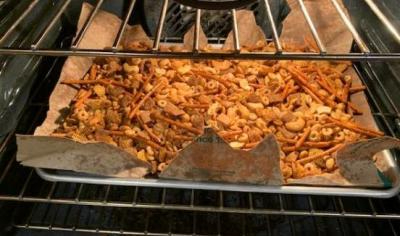 Homemade Check Mix
Homemade Check Mix
This page has a number of different Chex Party Mix Recipes: https://www.chex.com/recipes/?chex-mix
Mitake says, "The advantage of making your own is that you can decide that cashews are vastly superior to mixed nuts, and not have to pick around the parts you don’t like."
From Katy Patrick, Technical Writer
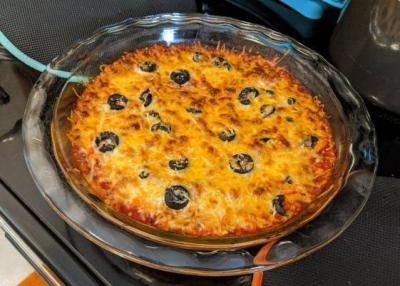 Mac & Cheese Pizza
Mac & Cheese Pizza
My family's favorite comfort food is Mac & Cheese Pizza.
Cook Mac & Cheese according to the box
Add a large egg and stir
Spread into foil-lined pizza pan. Or use a pie pan for a thicker "crust".
Bake at 350 for 15 minutes
Remove from oven, cover in pizza sauce, and add your favorite pizza toppings
Put back in the oven until the extra cheese is melted. I like to turn the broiler on at the end for a little extra crispness to the toppings!
From Marion Campbell, Customer Service Representative
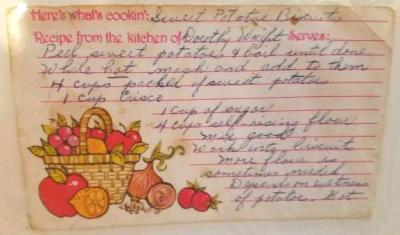 Sweet Potato Biscuits
Sweet Potato Biscuits
Here's what's cookin': Sweet Potatoe Biscuits
From the kitchen of: Dorothy Wright
4 cups packed of sweet potatoes
1 cup Crisco
1 cup of sugar
4 cups of self-rising flour
Peel sweet potatoes and boil until done.
While hot mash and add to them Crisco, sugar, and flour.
Mix good.
Work into biscuits.
More flour is sometimes needed. Depends on wetness of potatoe to be able to handle the mixture.
Bake at 350* for 20-30 minutes. Depending on size of biscuits.
Mix handles better if cooled.
Bake on greased cookie sheet.
From Drea Callicutt, Marketing, Sales & Communications Coordinator
Greek Meatballs
1 lb. ground turkey
1 package feta cheese
1 10-ounce box frozen spinach, thawed
1 raw egg
Greek Seasoning (I prefer Cavender's )
2 cloves garlic, minced
1/2 of a small red onion, diced
Italian Bread Crumbs
Oregano
Salt (I prefer Kosher Salt)
Black Pepper (I prefer Fresh Ground)
1 tbsp Olive Oil
1 tbsp Butter
Cookie Sheet
Preheat Oven to 350 degrees F.
Heat a large nonstick skillet over medium-low heat. Add the olive oil and the butter. When the butter melts, add the chopped red onion and chopped garlic and cook for 5 minutes. Transfer the onion and garlic to a large bowl to cool.
Add ground turkey, feta, greek seasoning, egg, garlic, onions, and spinach to a large mixing bowl. Then add the Greek Seasoning, Oregano, Salt & pepper to taste.
Get your hands dirty. Take off your jewelry and stick your hands in the bowl and start mixing it all together. The bread crumbs you add incrementally until you get a good consistency. You want to mixture to be moist but not runny. If you add too many bread crumbs, you can always add another egg for more moisture.
Wipe a cookie sheet down with Olive Oil.
Roll meatballs together between your palms and place on the cookie sheet approximately 2" apart.
Bake for 30 minutes and 350 degrees.
Notes: I use this same recipe to make burgers, meatloaf and meatballs. For the burgers, I can get 3-4 from 1 lb. of ground turkey and will either pan cook them in some olive oil, or grill them. For meatloaf, I place the whole mixture in a loaf pan greased with a bit of olive oil and then cook it at 350 for approximately 1 hour. Meatballs can either be pan fried or baked. I prefer baked cause it helps to reduce the amount of fat.
Butternut squash sausage soup
 8 cups vegetable or chicken stock
8 cups vegetable or chicken stock
3 carrots chopped
3 stalks celery chopped
1 onion chopped
1 butternut squash
3 cloves minced garlic
Olive oil
Salt & pepper
Sage
Tarragon
Parsley
Ginger
8 oz Cream cheese
1 lb sausage
Preheat oven to 400*F.
Half butternut squash lengthwise and put in a casserole dish.
Brush with olive oil and sprinkle with salt & pepper.
Cook at 400* for approximately 45 minutes or until you can easily spear it with a fork.
Remove squash and set aside.
In a large pot sautée onions and garlic in olive oil on medium heat.
Season with salt & pepper.
Add stock, carrots, and celery.
Add sage, tarragon, parsley, and ginger to taste.
Scrape roasted squash out of skin and transfer to the pot.
Bring to a boil.
Reduce heat to low, put lid on pot and let simmer for 2 hours.
Use immersion blender to combine vegetables until smooth.
Add cream cheese and blend again.
Brown sausage and transfer to pot.
Cook for another 20-30 minutes.
Serve.
- Katy Patrick
- News
While NLS provides the majority of the Talking Books collection, many libraries supplement this with locally recorded books and magazines. You've put a lot of time and resources into these titles, so of course you want to make sure these can get to your patrons, or even to share them with the other network libraries! But, as with everything else, the new Duplication service model and January's major server failure posed some disruptions to this. Let's take a look at where everything stands now, and where we're heading.
Read on for:
- DBCs available on BARD
- SHELF Titles
- Other Local Titles (Including Serials!)
Hopefully this will help answer your questions about making Locally Produced Titles available to your patrons and to the network!
DBCs available on BARD -
Locally produced books that have been through NLS' process and are avaible on BARD are fully supported for Duplication on Demand with any hardware setup (Gutenberg, Scribe, or traditional PCC). All you need are the BibRecs--any local storage using R-sync or any Duplication hardware can receive the files via NLS, and KLAS' automatic eDoc generation will make sure that aspect is in place. If you do not yet include DBCs in your regular MARC loads, and are moving to duplication soon, contact Customer Support to get them added in!
SHELF Titles -
The SHELF Project was created to support the sharing of locally produced titles before NLS provided the option to submit them to BARD, and is still in use. Libraries may chose to share titles via SHELF if they do not meet all of NLS' criteria, or if they have not yet been submitted (such as when a library has a large back-log of local titles). Additionally, SHELF supports serial titles such as magazines.
Unfortunately, SHELF was hit hard by the loss of our SAN server and back-up. Nothing was lost and support for downloading the existing Shelf Titles is still in place! However, the ability to upload new files to our new server is still a work in progress.
As part of this work, the database used to host SHELF has been upgraded from KLAS 7.5 to 7.7--requiring all of the SHELF-specific functionalities to be imported to the 7.7 baseline. While doing this, our developers are actively working on some long wait-listed improvements.
The ability to upload new titles to this new SHELF database and for SHELF to then distribute the MARC records and eDocs for those titles to the other SHELF libraries is still in process, but we expect it to be finished soon. When these are available again, they should be easier and better than ever! Here's how we expect it to work:
- File uploads will still use an FTP client, now directed to books.klas.com (just like other local titles for Scribe).
- The SHELF database will create BibRecs using the originating Library ID and original KLAS ID (E.g. UCSC-VDB0002). The originating Library ID, original KLAS ID, and SHLEF's new KLAS ID are kept in the 901 tag which gets propagated out to libraries.
Serial titles will actually use serial records, rather than kludged monograph records. - The BibRec Import/Export procedure is simplified to be more purely based on the MARC. There is no separate XML structure passed around for BibRec information or eDoc information.
- Edocs in the recieving libraries are created using the 856 tag information in the MARC data, making the titles downloadable over the WebOPAC.
Finally, once all of this is in place, SHELF titles will be fully supported for duplication via Scribe! Duplication will also be possible on Gutenberg or traditional PCC, but you may need to follow the procedures in the next section to make the files available to your duplication hardware and to generate eDocs that are valid for that system.
Again, all of this is still in the works, but watch the Release Lists and the Friday Wrap-up emails because it should be coming soon. I will also be making more specific how-to information available when the workflows are finalized and available.
Other Local Titles -
To Duplicate any title, you need three pieces: a BibRec, a file, and an eDoc that connects the two. To Duplicate local titles that are not availble on BARD, you will need to make the file available to your duplication hardware another way.
For Scribe: You may use your own local storage device (as with traditional PCC), but the Scribe Mini has it's own internal storage which makes this unnecessary. To add local tiles to your Scribe unit(s), you can upload the files to the centralized storage depository (books.klas.com) using any FTP Client. Shelf Titles will automatically be available, no extra upload needed. Serials are also fully supported!
In the future, we hope to support uploading local titles through KLAS itself rather than needing an FTP Client, but in the meantime, follow these instructions to upload local Titles to your Scribe:
- QuickTip - Upload Local Titles (Scribe)
For Gutenberg: It is also possible to duplicate local titles on Gutenberg, but please contact NLS for instructions on uploading the files. Support for local Serials on Gutenberg is in-process--we are just waiting on some assistance from NLS for final testing.
- QuickTip - Upload Local Titles (Gutenberg)
For Traditional PCC: Because traditional PCC setups use a variety of storage solutions, it is hard to provide general instructions. However, most solutions allow you to connect to your local storage and add files via the network. Serials should work with traditional PCC. However, bear in mind that all local issues would need to be re-uploaded on a Scribe or Gutenberg once you transition. As such, we recommend you wait for SHELF to be available or for your choice of duplication hardware to arrive.
For Any: With any of these systems, once the files are in the right location and you have a matching BibRec, KLAS will create the eDocs overnight. Full instructions for using local Serials with duplication (currently available for Scribe and PCC, available soon for Gutenberg) are available:
- HowTo - Local Serials (Scribe)
- HowTo - Local Serials (Gutenberg)
- Teresa Kalber
- News
"Hot off the Press" is blog series from guest blogger, Teresa Kalber. Teresa is the Network Systems Administrator at Colorado Talking Book Library. In this series, she shares her library's experience being one of the first two KLAS libraries to implement NLS' Gutenberg equipment.
The first four posts in the series are here:
- Hot off the Press: Part 1
- Hot off the Press: Part 2
- Hot off the Press: Part 3
- Hot off the Press: Part 4
Hot off the Press: Part 5, Problems and ongoing issues
Here is a recap of some of the issues we have/are experiencing with Gutenberg.
Service Queue/Order issues:
- With DoD, patrons now have to the entire collection on BARD. Because of this they are getting books in subjects they may not have been before and also getting a lot of the newer books. We get a lot of RA calls for patrons saying I would never order books like this. The RAs go through their subjects and work with them on getting them the type of books they like. This has brought up the issue that there is no easy way to empty the service queue. Each item must be deleted one at a time. If all the items are deleted out of the queue, KLAS hangs up and usually needs to be restarted.
- Because of the issue above, we are still in flux as to the default number of books we want in the service queue and where the refill point should be. This has also been problematic for us as it results in cartridges going out with less than the 10 we have them set for.
- When RAs are trying to create an order for a patron, it takes our system over 5 minutes to open the “Create Dup Order From Queue” screen. This makes it difficult to create orders for patrons when also taking phone calls because of the time involved. Many times they will have to make a note and go back and create the patron’s order later.
- Cartridges will go out for our on-demand patrons, so we need to have their NS Cutoff set to 0 to prevent that from happening.
- Local Recordings:
- We have been working with both NLS and Keystone to figure out how to get our locally recorded books that are not on BARD to work with Gutenberg. We think we have come up with a solution, but it will take some time to implement.
- Keystone is also working on having functionality for Serials in place for Gutenberg so that we can put our local newsletter on the duplications cartridges.
Cartridge Errors:
- When the service queue is filled, it will select books from our local recordings for patrons. Because we had not solved the problem with our local books, this would cause the cartridge have an “error” status. There is currently not a way to run reports or queries in KLAS to find these errors and make sure those patrons are getting service.
- Also for cartridges that are in error status – the books on the cartridge are not added as a has-had to the patrons record since the cartridge never got checked out. But since the cartridge is on the orders tab, those books are not eligible for selection. There is currently no easy way to get those books back on the service queue.
Gutenberg Hubs:
- Sometimes a cartridge is scanned and the internal and external barcode have not been linked. There is a way to configure a port on the Gutenberg machine to plug in a cartridge and have that connection made. NLS is now sending out the machines with this port already configured. Ours was not sent that way and I had to create the port myself. Once I configured the port, Gutenberg stopped recognizing the first hub in the toaster rack attached to that computer. I don’t know if the two events were related since we have ongoing issues with Gutenberg not recognizing hubs at various times. We are working with NLS on this. It’s a fairly simple fix, but it is an issue.
- Offender (Inmate) Accounts:
- We handle our offender mail separately from our other patrons’ mail. Because of this, we have not converted our offenders to duplication service since we don’t currently have a way to run their cartridge orders separately from the rest of the orders.
- Cartridge issues:
- We ordered a supply of cartridges from Perkins to help with the problem of large orders being created. The Perkins cartridges do not have external barcodes on them. We had to work with NLS to figure out a way to be able to use these cartridges with Gutenberg. Since we placed the order, KLAS put a fix in place to prevent orders larger than 4GB to be sent to Gutenberg for copying.
- We also ran into problems trying to repurpose the green cartridges we purchased to use. NLS had to make a setting change in Gutenberg for us to be able to use these cartridges with the system. However, we have to go into another computer, plug in the cartridges and unlock them with the DTB Protect software before we can use them with Gutenberg.
I hope you enjoyed my posts on our conversion experience. Both Debbi and I have documents we kept during the process that we would be happy to share. I’ve also started a post in the discussion forum if you have questions or would like me to cover something not included in these posts.
- Teresa Kalber
- News
"Hot off the Press" is blog series from guest blogger, Teresa Kalber. Teresa is the Network Systems Administrator at Colorado Talking Book Library. In this series, she shares her library's experience being one of the first two KLAS libraries to implement NLS' Gutenberg equipment.
The first three posts in the series are here:
Hot off the Press: Part 4, Converting existing patrons
On November 4th, we began the process of converting our existing patrons over to the duplication model. We decided to go with our high-demand patrons (we have a separate patron type for high-demand) first, followed by students. Then we worked on converting the remainder of our patrons based on the number of books they were receiving. We initially set patrons up to get 1 cartridge with 10 books on it.
The first day I converted 100 patrons over. However, I realized that in order to complete the conversion by the end of the year, we would need to convert more than that each day. After discussing this with our mailroom supervisor, it was decided to convert 200 patrons each day.
As I ran queries in KLAS to find the patrons I needed to convert, I created Excel spreadsheets with lists of 200 patron ID’s and saved them as text files with the date I was converting them to DoD. Then I could pull the query into KLAS and use the Batch Update Profile tool to convert all 200 patrons at one time. Then I would scroll through the records to verify everything looked like it should.
One of the problems we had early on was duplication orders being sent to patrons that had a block on their account. As I was scrolling through the patrons, I would find those patrons and make their digital book service inactive so no cartridges would go out. Once the problem was fixed in KLAS, I changed all these patrons back to active for digital books, so those that had an automated date to restart service would get a cartridge.
One week after a patron was converted to DoD, I would to run the same query again and bump their number of cartridges up to 2, and after another week, set them to our max of 3 cartridges. We gradually increased their number so they didn’t get all 3 cartridges at once and also to try and not overwhelm mailroom staff.
Most days, we were getting around 250 orders. We figured once our conversion was done, we would get somewhere between 300-400 cartridges per day. In order to try and meet those numbers and see how it would affect mailroom staff, I upped the number of patrons being converted to DoD to 300 per day.
Around mid-November, we noticed that KLAS and Gutenberg didn’t appear to by syncing again. Orders we created in the morning we not being sent to the Gutenberg machines. We were unable to serve walk-in patrons because their orders wouldn’t go through. After looking into the problem, we discovered that the batch manager was being overwhelmed with creating service queues for the patrons I had converted that morning. After figuring out this was the problem, I didn’t do conversions until after 3:30 in the afternoon. John C. at Keystone also mentioned putting something in place on KLAS so the service queue would function more efficiently (not sure if this was done or not).
Around the same time, NLS had problems with one of their servers, and our duplication order didn’t run in the morning. Because I had converted patrons in the morning, our order didn’t start copying until 3:30 in the afternoon. That caused us to have almost 1000 cartridges the next day. I guess it was a good test for how much duplication we can get done in a day.
With this large order, we realized the copying process went fairly quickly and we could easily make this many cartridges each day. However, printing the mailing cards took most of the day. So we decided to invest in a 2nd printer to alleviate the bottleneck at the printer.
On 12/3, I converted the remainder of our individual patrons to duplication and also the 200 organization accounts we had on automated digital book service. This resulted in our largest duplication order of 1,015 cartridges, although I’m not sure why. Once this conversion was done, I spent the next 2 weeks moving all the patrons up to 3 cartridges each. The process was completely done by 12/11/19, which worked out great since we needed to be closed the week on 12/16 due to a building maintenance issue.
Statistics for 11/4/2019 – 12/31/2019:
- 15,721 cartridges sent out
- 3,790 cartridges returned
- 4,711 patrons received duplication cartridges
Up next: Problems and ongoing issues
- Teresa Kalber
- News
"Hot off the Press" is blog series from guest blogger, Teresa Kalber. Teresa is the Network Systems Administrator at Colorado Talking Book Library. In this series, she will be shares her library's experience being one of the first two KLAS libraries to implement NLS' Gutenberg equipment.
The first two posts in the series are here:
Hot off the Press: Part 3, The Pilot
We received our equipment on a Friday and got everything working on the following Monday. Even though we had the system working on Sept. 23rd, we didn’t do any testing until I returned to the office on Sept. 30th.
When the Gutenberg system is first installed, it is operating in “sandbox” mode and is connected to the preview database for KLAS. We tried to push through a few orders for staff from the preview database, but they weren’t being copied onto cartridges. It was finally determined that KLAS and Gutenberg weren’t syncing with each other so the orders weren’t getting processed. Once Keystone restarted the syncing process, the orders came through. So on Oct. 2nd, we switched from sandbox to production mode so we could really test the system by starting the pilot.
We began the pilot with 50 existing patrons. For the existing patrons, we decided we would send out 2 cartridges with 3 books on them so we could get them back during the month long pilot and test the return part of the system too. We also made the decision to not send books out to new patrons about a week before we started the pilot. So since the end of September, all the new patrons have been put on the duplication model. New patrons were set-up to receive 3 cartridges with 10 books each on them.
On Oct. 3rd, we sent out our first 76 DoD cartridges! Yay!
The most consistent problem we noticed in the first few weeks of running Gutenberg was that daily KLAS and Gutenberg would stop syncing and we’d have to contact Keystone to restart the process. Because the problem was so consistent they wrote a temporary fix to automatically restart the service each morning to try to help with the process. Within 2 weeks of starting the pilot the problem has been solved and a fix applied during an update of KLAS.
We also had problems with serving walk-in patrons due to the time it would take to process an order. At first, Keystone and Gutenberg were only syncing every 15 minutes. So we would place an order and potentially have to wait up to 15 minutes to see if the order synced or not. If it didn’t sync and we needed to contact Keystone to restart the service, another 15 minutes would pass. Many times we would just pull individual books from the shelves and check them out using front desk since we are unable to assign books to a duplication patron. However, I believe the sync times have been cut down and we don’t usually have problems serving walk-ins now. An order for a walk-in patron, will be sent fairly quickly, even if we are still in the midst of making cartridges for the day. So mail room staff have to check mail cards as they scan each completed cartridge to look for the walk-in patron’s order.
A big learning curve came in how to best figure out how to set the nightly settings for DoD, since it works a little differently than it did before. When I would call Nancy, she would tell me “theoretically” it should work this way. I had to just make adjustments and then see what happened afterwards. Luckily our pilot patrons were very understanding during the process.
Other minor problem we encountered (that have all been fixed now):
- Service queue was adding all the books in a series, even if the patron had already had them before.
- Service queue was adding oldest books from request list, when we had the system set to add the newest books first.
- KLAS would allow orders larger than 4GB, which would then sit on Gutenberg since we didn’t have a cartridge big enough to copy the order
- Duplication orders were still being processed for patrons with a block on their account.
On Oct. 22nd, we participated in a conference with NLS, Keystone and Georgia to discuss how we felt things were going with our pilots. Both of us agreed that there were some minor problems, but nothing to prevent us from moving forward with beginning to convert the rest of our patrons over to DoD. We decided to start the conversion process at the beginning of November with the goal of being completely done with the conversion by the end of the year.
Statistics for our pilot (10/3 – 11/1):
- 644 cartridges sent out
- 192 patrons on DoD
- 91 cartridges returned
Up next: Converting existing patrons
- Teresa Kalber
- News
"Hot off the Press" is blog series from guest blogger, Teresa Kalber. Teresa is the Network Systems Administrator at Colorado Talking Book Library. In this series, she will be shares her library's experience being one of the first two KLAS libraries to implement NLS' Gutenberg equipment.
The first post in the series is here: Hot off the Press: Part 1.
Hot off the Press: Part 2 - Setting up and testing the Gutenberg Equipment
Warning: a little geeky
On Friday, September 20th, our shipment of equipment arrived from NLS. We received:
- 2 Gutenberg workstations with monitors, keyboard, and mice
- 2 scanners – 1 for check out, 1 for returns
- 2 sets of 20 cartridge slot toaster racks
- 2 sets of USB hubs to attach the toaster racks to the computers
- 2 surge protector power strips
- Lexmark Printer
All of the items are clearly marked with tags to show you how to connect everything.
Back of the Toaster
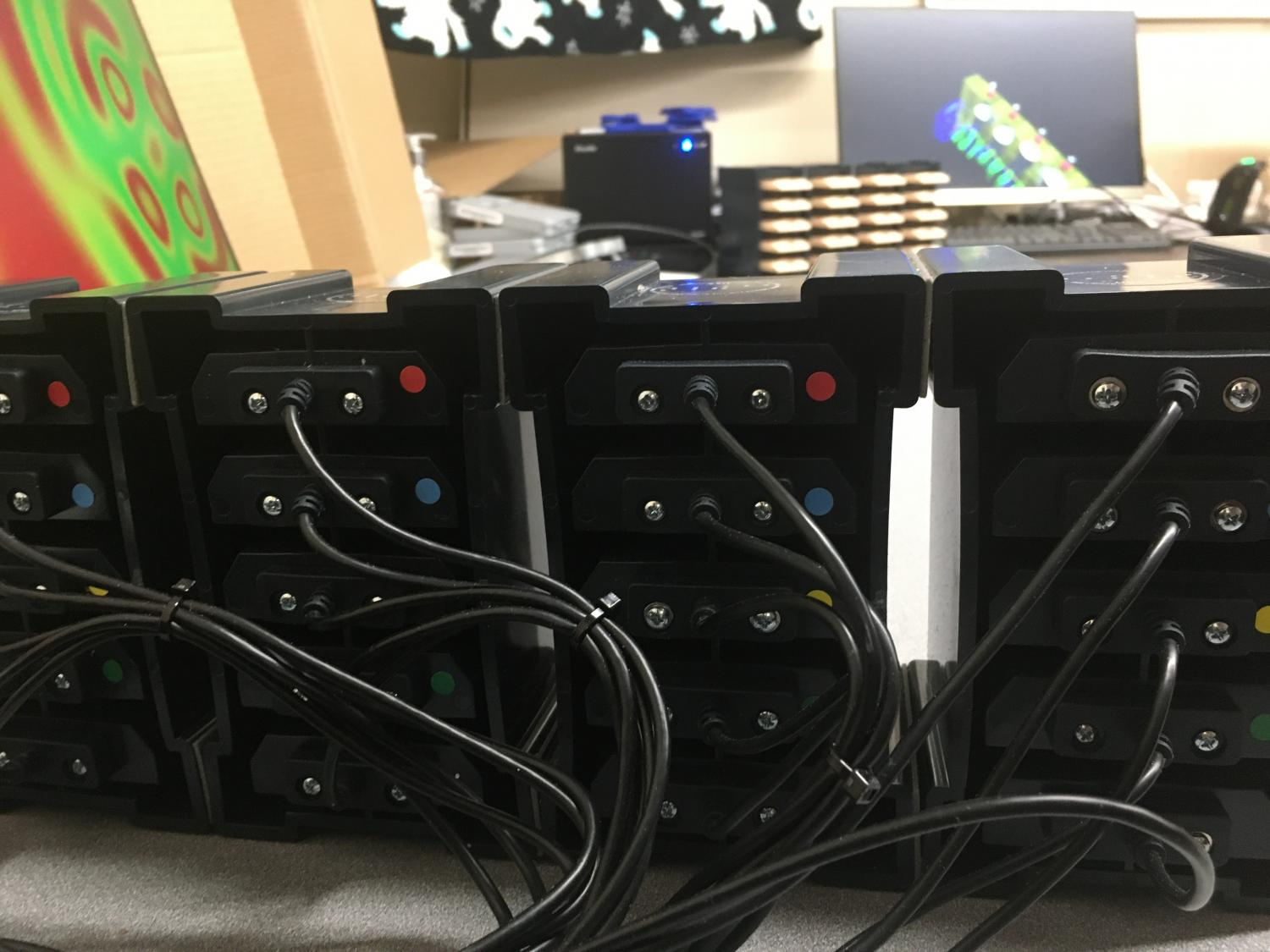
USB Hub
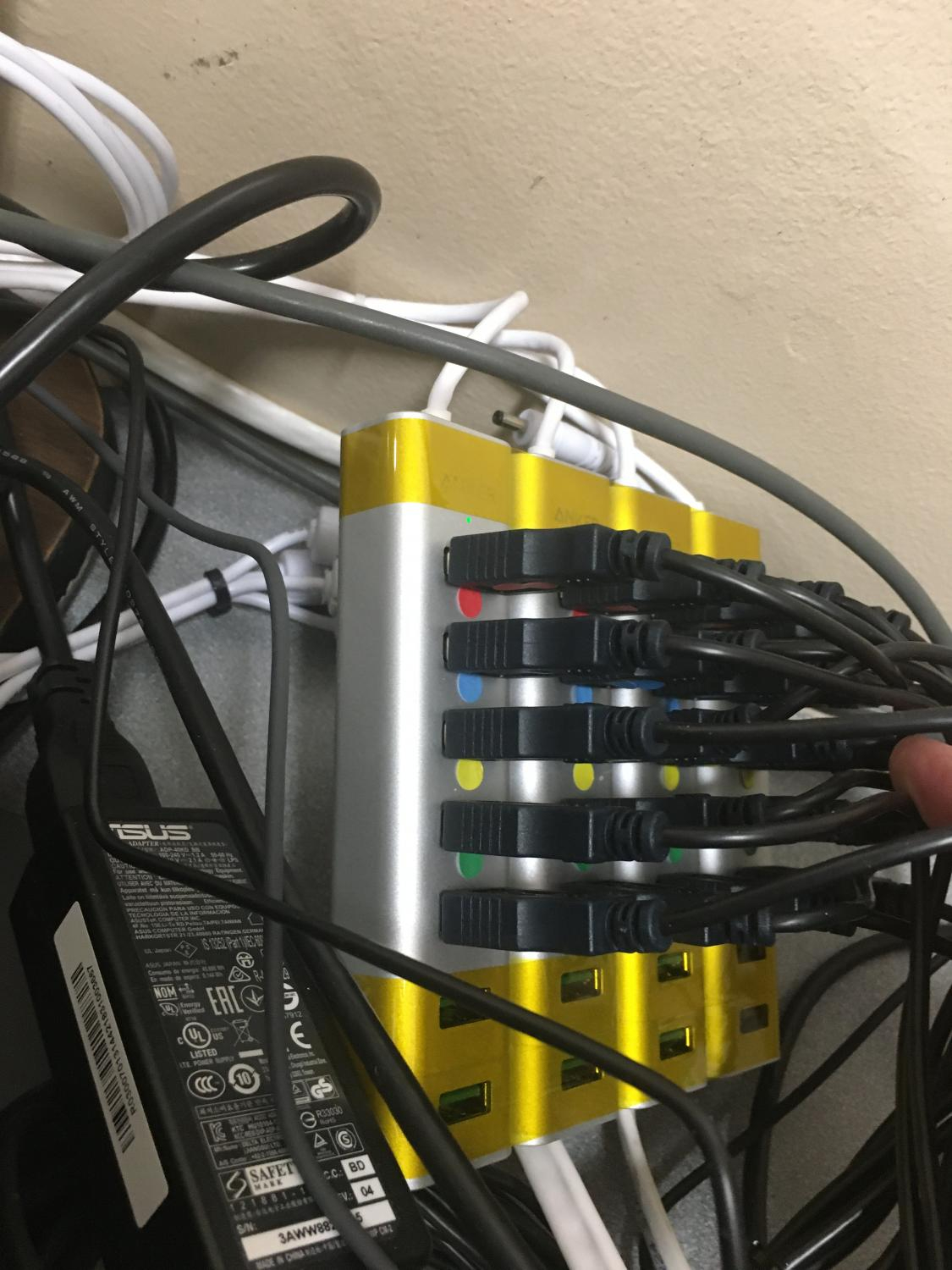
Hub Top
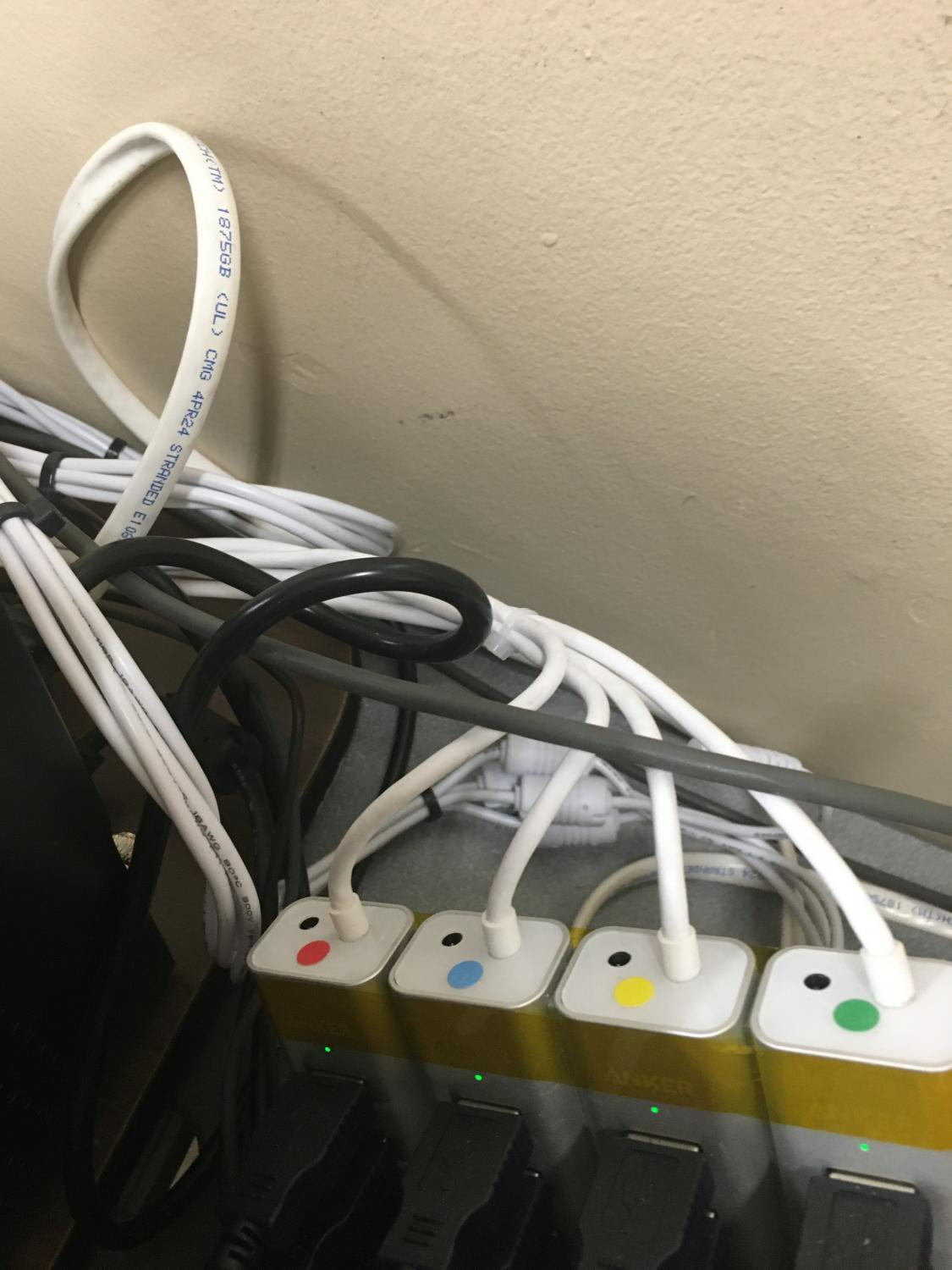
Computer Back
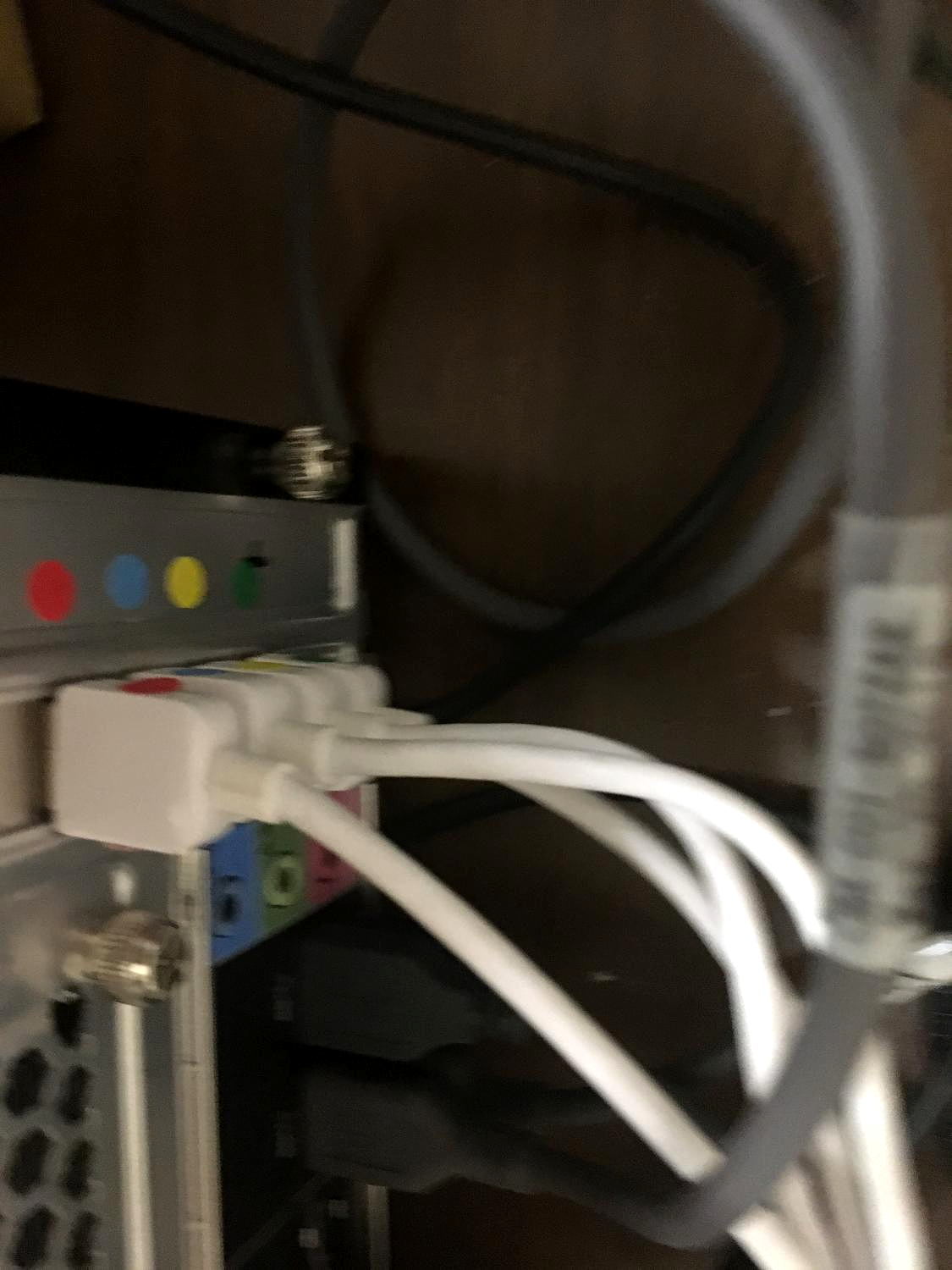
I immediately set-up the equipment so we could begin testing since I was scheduled to be on vacation the following week. NLS sends instructions in an email of what to do once the equipment arrives. One of the functions on the Gutenberg equipment is a “health check” app. In my hurry to get everything set-up, I forgot to run the health check and contacted both NLS and Keystone to let them know the equipment was installed and turned on.
Picture – HealthCheck_LI (screen shot of Gutenberg desktop with HealthCheck icon circled)
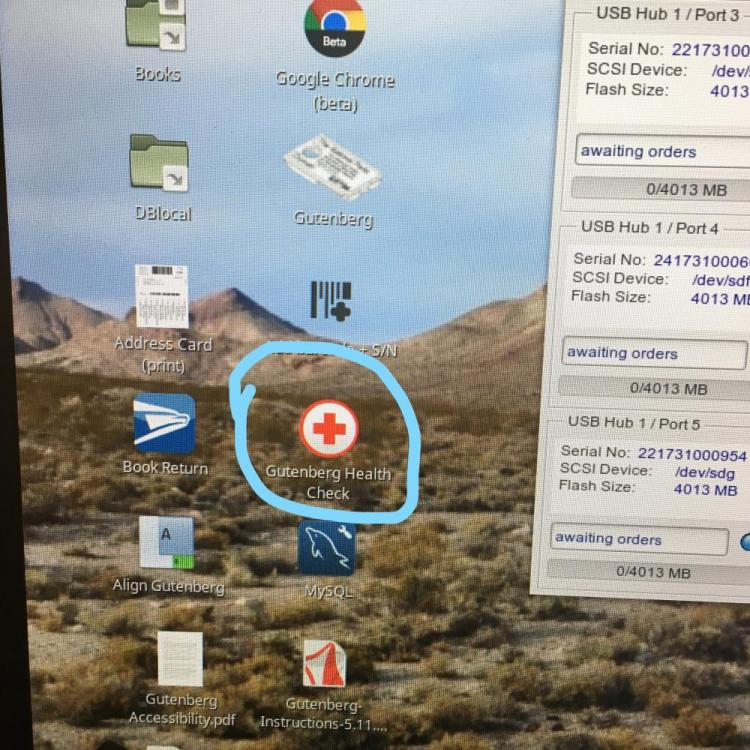
John C. contacted me and asked if I had run the health check since they were unable to connect to our Gutenberg equipment. Since we received two machines, NLS sets one up as the main computer (called CO1A and set with a static IP address) and the other as a secondary computer (called C01A-2). When I ran the health check I found that CO1A wasn’t connecting to the VPNs it needed to access.
I came in on Monday so we could troubleshoot the problem. I contacted our Network Administrator and had him monitor the firewall and traffic coming in and out of the Gutenberg machines using the static IP address we gave CO1A. He could not see any traffic being blocked or any firewall rules preventing access to the system. While I was on the phone with him, I was also having email conversations with NLS and Keystone staff about the problem.
Finally, during a conference call with John C and Mark at Keystone, Mark made a comment about CO1A not connecting to our DNS server. I looked at the settings on the machine again and realized the IP address for our gateway server had been entered as the IP address for our DNS server. Once I corrected the IP address in the settings for CO1A rebooted it, everything starting working. Then Mark and John C worked their magic to finalize the connection and push a test order through the system.
So lesson learned – double check all the settings on the Gutenberg machines very carefully once they are received and set-up.
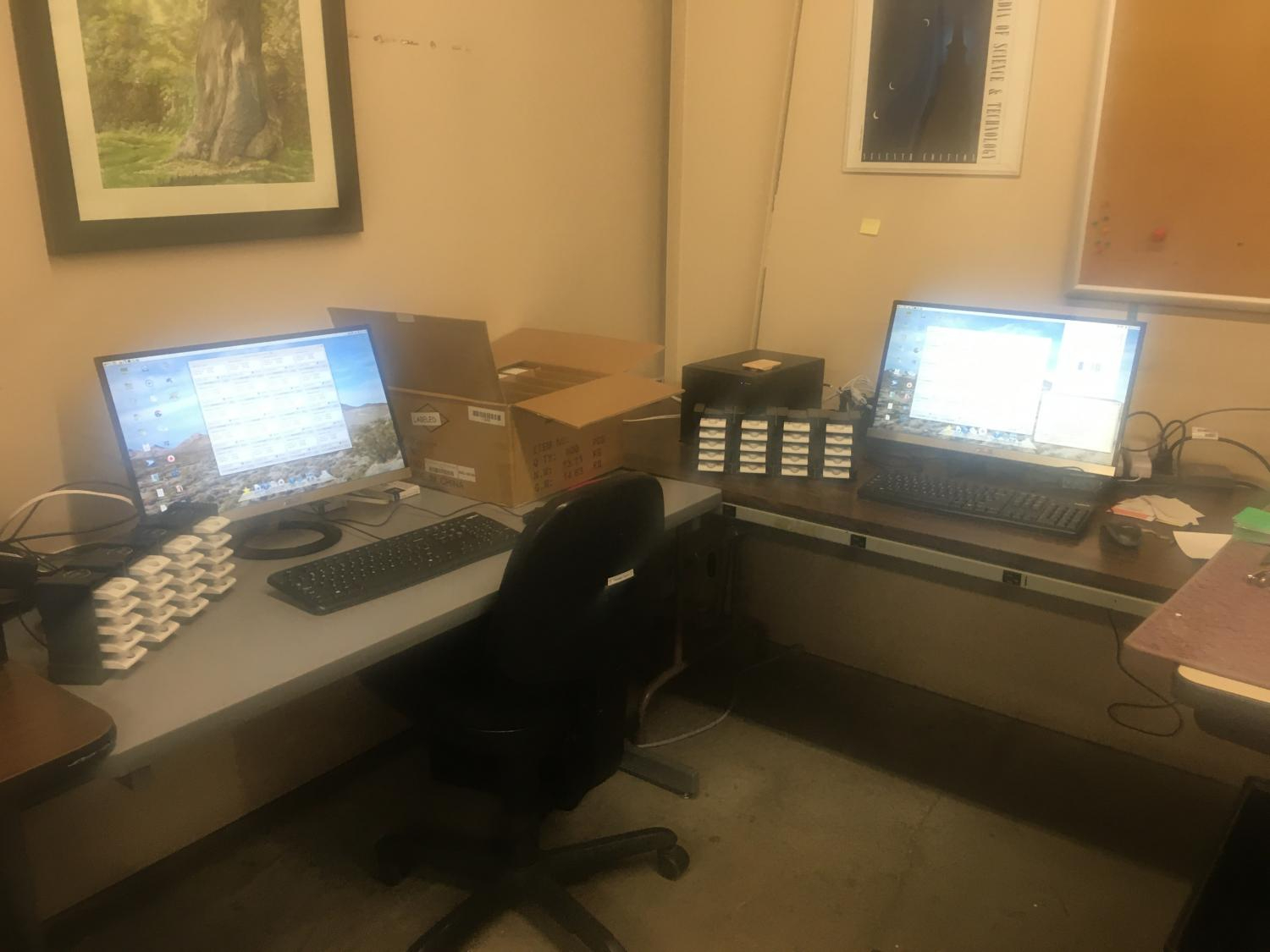
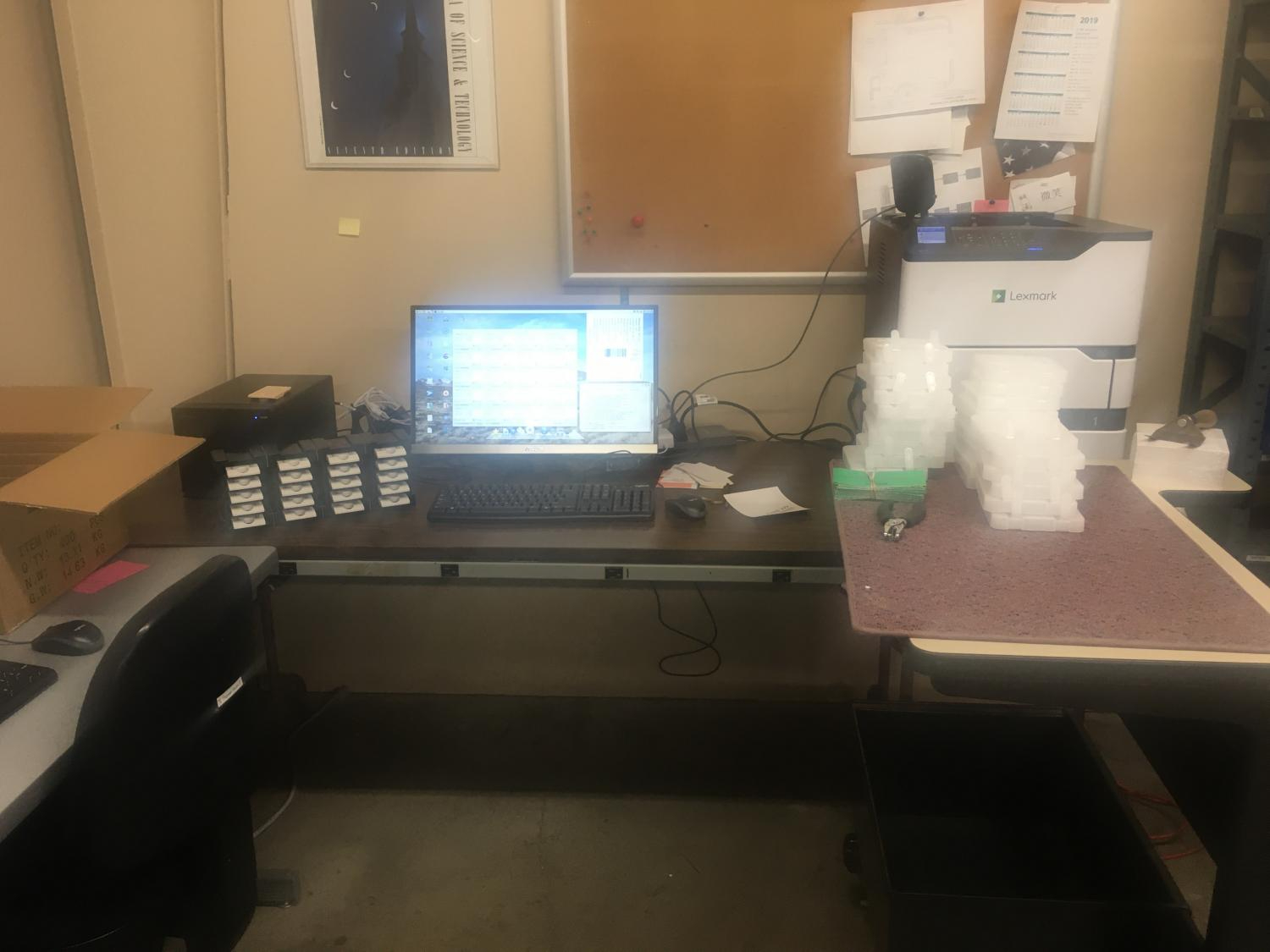
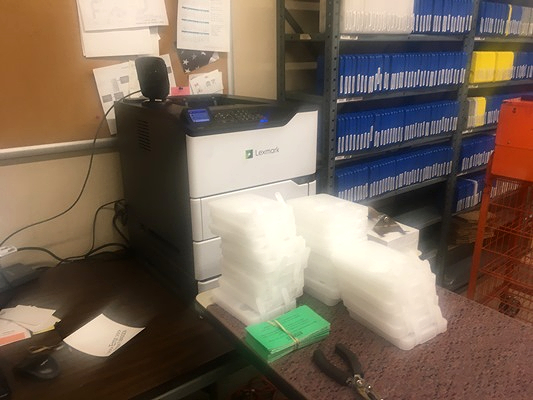
Up next: Testing the system
- Teresa Kalber
- News
Welcome to the "Hot off the Press" blog series from guest blogger, Teresa Kalber. Teresa is the Network Systems Administrator at Colorado Talking Book Library. In this series, she will be sharing her library's experience being one of the first two KLAS libraries to implement NLS' Gutenberg equipment.
Hot off the Press: Part 1
A little delayed, but as promised we are sharing our experience of converting over to Gutenberg duplication as our main circulation method. This first installment will cover our pre-planning steps.
Our Director has been excited about using duplication on demand since she first heard about it. Knowing this and also knowing our KLAS server was reaching end of life and would not support KLAS 7.7, I began conversations with both our IT department and Keystone as early as December 2018 with a plan to have our server replaced by June 2019. I also started discussions with our security officer and our network administrator about DoD to ensure we would be able to use the equipment on our network without issues.
In May 2019, we found out we had been chosen to be the self-hosted pilot site for Gutenberg integration with KLAS. Our IT department had set-up a new virtual server for me and agreed to allow Keystone to submit an image to be placed on the server to run KLAS. Their caveat was that they would not provide support since the software didn’t conform to standards. Since they have never provided support for our servers anyway, I didn’t see this as a problem.
Things we needed to think about between finding out about the pilot and getting the Gutenberg equipment in September:
- Placing an order for additional mail cards beyond what NLS provides
- Preparing cartridges and containers to use for DoD
- Placing labels on unused cartridges and containers
- Stripping labels from used cartridges and containers and replacing with new labels
- Notification of patrons – we did a blurb in our newsletter and that was our only notification to patrons.
- Selecting patrons for the pilot (if you do one)
- When to start new patrons on DoD (we started new patrons when we started the pilot)
- When to zero out copy allotment so no new books come
- How to cut-over patrons once the pilot is complete
- Initial default number of books on a cartridge and default number of cartridges (We used 10 books/3 cartridges per patron as our default)
Both NLS and Keystone have documents of things to consider during planning stages. NLS also has a great overview of the necessary IT requirements. Once I received this document, I forwarded it to our Security Officer and Network Administrator to ensure there would be no problems in using the Gutenberg equipment on our network. I think opening these lines of communication early helped the process go more smoothly.
We were finally able to convert to KLAS 7.7 on August 19, 2019. This gave us about a month to iron out any issues before receiving our equipment from NLS on September 20th.



